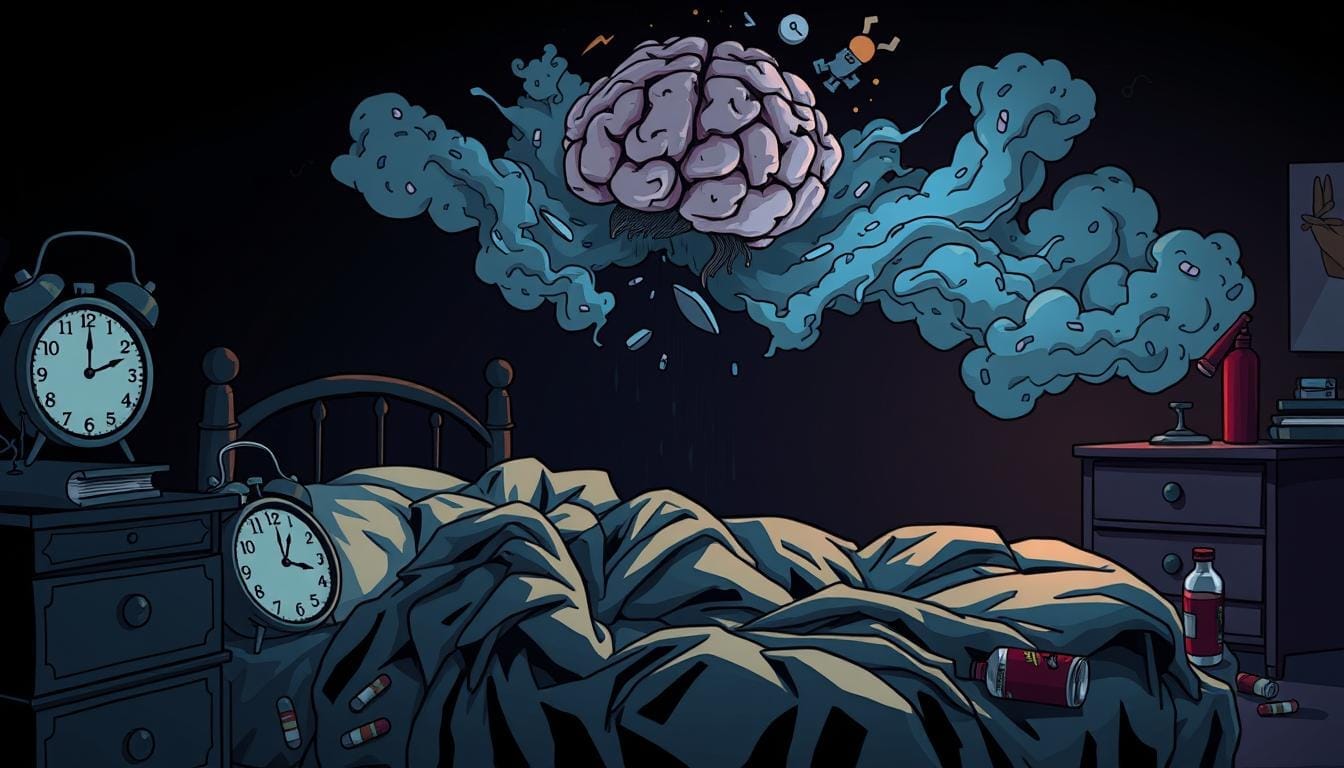How I Cured My Neuropathy: A Personal Journey to Nerve Pain Relief
Tingling feet? Numb fingers? That constant burning sensation that just won’t quit? If you’re nodding along, you’re likely one of the millions grappling with neuropathy, a frustrating and often debilitating nerve condition.
You’ve probably tried everything: creams, medications, even electrical stimulation devices—but the results have been… underwhelming. The search for real relief can feel like chasing a ghost.
Traditional medicine often focuses on managing symptoms, not addressing the root cause. But what if there was more to the story? What if natural treatments, innovative therapies, and lifestyle changes could actually make a difference?
In this article, I’ll share how I cured my neuropathy through a holistic, research-backed approach. We’ll explore:
The underlying causes of neuropathy
The best supplements for nerve healing
Natural treatments and lifestyle changes that worked for me
Cutting-edge research on reversing neuropathy
Because living with constant pain isn’t living—it’s surviving. Let’s explore how to get you back to truly living.
Understanding Neuropathy: What Causes It?
Neuropathy is a condition where damaged nerves disrupt the way your brain communicates with your body. It can cause:
Tingling or numbness in hands and feet
Sharp, stabbing, or burning pain
Muscle weakness and loss of coordination
Heightened sensitivity to touch
Common Causes of Neuropathy
Diabetes – High blood sugar damages nerves over time.
Vitamin Deficiencies – Lack of B12, folate, and vitamin D weakens nerves.
Autoimmune Diseases – Conditions like lupus, rheumatoid arthritis, and celiac disease can trigger nerve damage.
Toxin Exposure – Alcohol, heavy metals, and certain medications harm nerves.
Injuries & Pressure – Pinched nerves from injuries or repetitive stress.
Can Neuropathy Be Cured?
Yes! While nerve damage can be difficult to reverse, in many cases, proper nutrition, lifestyle changes, and targeted supplements can help regenerate nerves and restore function.
How I Cured My Neuropathy: My Personal Recovery Plan
For months, I struggled with numbness, tingling, and burning pain in my feet and hands. Medications barely made a difference, and doctors told me neuropathy was irreversible. But I refused to accept that.
Step 1: Identifying the Root Cause
Through comprehensive blood tests, I discovered:
Severe Vitamin B12 Deficiency – Essential for nerve repair
Chronic Inflammation – Worsening nerve damage
High Blood Sugar Levels – Slowing nerve healing
Fixing these issues became my #1 priority.
The Supplements That Helped Me Reverse Neuropathy
1. Vitamin B12 – The Nerve Regenerator
B12 is essential for nerve health, and a deficiency can worsen neuropathy symptoms.
Best Form: Methylcobalamin (better absorbed than cyanocobalamin)
Dosage: 1,000–5,000 mcg daily
2. Alpha-Lipoic Acid (ALA) – The Antioxidant Powerhouse
ALA helps reduce nerve inflammation and restore nerve function.
Dosage: 600-1,200 mg daily
3. Acetyl-L-Carnitine – The Nerve Repair Booster
This amino acid supports nerve regeneration and pain reduction.
Dosage: 500–1,500 mg daily
4. Magnesium – The Muscle Relaxer
Magnesium helps relax nerves and improve circulation.
Dosage: 300–400 mg daily
5. Omega-3 Fatty Acids – The Anti-Inflammatory Aid
Found in fish oil, flaxseeds, and walnuts, Omega-3s help repair nerve damage.
Dosage: 1,000-2,000 mg daily
Natural Remedies That Worked for Me
1. Infrared Light Therapy
Boosts blood circulation to repair damaged nerves.
2. Acupuncture
Helps reduce nerve pain and stimulate healing.
3. Chiropractic Adjustments
Releases nerve pressure and improves mobility.
4. Nerve Stimulation Devices
TENS (Transcutaneous Electrical Nerve Stimulation) therapy helps block pain signals.
5. Herbal Remedies (Turmeric & Boswellia)
Powerful anti-inflammatories that reduce nerve pain naturally.
Lifestyle Changes That Support Nerve Health
Eat a Low-Inflammation Diet: Cut sugar, refined carbs, and processed foods.
Exercise Daily: Walking, yoga, and stretching improve circulation.
Manage Stress: Meditation and deep breathing lower nerve-damaging cortisol levels.
Prioritize Sleep: Healing happens when you rest. Aim for 7-9 hours per night.
Frequently Asked Questions (FAQs)
1. Can Neuropathy Be Cured Naturally?
It depends on the cause. If caught early, nerve damage can be reversed with the right supplements, diet, and lifestyle changes.
2. How Long Does It Take to See Results?
Some people notice improvements in a few weeks, while others take 3-6 months to experience relief. Consistency is key!
3. What Foods Should I Avoid If I Have Neuropathy?
Processed sugars, alcohol, refined carbs, and trans fats worsen nerve damage.
4. Can Exercise Help With Neuropathy?
Yes! Light exercise improves circulation, reduces inflammation, and supports nerve healing.
5. Do I Need Medication for Neuropathy?
Not always. While medications can help manage pain, they don’t address the root cause. A holistic approach is often more effective.
Final Thoughts: Take Control of Your Nerve Health
If you’ve been told that neuropathy is irreversible, don’t lose hope. With the right combination of nutrition, lifestyle changes, and targeted supplements, you can:
Reduce pain and tingling
Improve mobility and circulation
Support nerve healing naturally
I used to believe I’d live with neuropathy forever—until I found the right approach. If I can reverse my neuropathy, you can too.
10 Tips for Supporting Nervous System Development in Children
Childhood brain development is a key time for growth and potential. Parents and caregivers can help by understanding early neural pathways. This helps support children's brain growth.
Research shows how to help children's nervous systems grow well. Babies start with 100 billion nerve cells. Early years are key for making connections in the brain.
Good nutrition is vital for brain health. Foods like eggs have choline, which helps the brain grow. A diet lacking zinc can hurt memory and learning.
Supporting the nervous system needs many approaches. Nutrition, exercise, sensory experiences, and positive interactions help. These activities build strong brain connections for learning and feeling emotions.
By age 5, 90% of brain growth is done. Early help can set up a strong foundation for life. It helps with learning and feeling emotions.
This guide will share ten tips from experts. They will help you support your child's brain development. You'll get practical advice for their neurological growth.
Understanding the Nervous System and Its Importance
The human nervous system is like a complex network in our body. It controls all our cells and helps us grow. At birth, we have about 100 billion neurons. This system is key for a child's growth and learning.
Nervous system development starts with simple steps. These steps help us learn and grow. From the brainstem to higher brain functions, each step is important for our brain to mature.
Exploring Nervous System Fundamentals
The nervous system has several important parts. They all work together to help a child develop:
- Brain: Controls complex functions
- Spinal cord: Sends messages
- Peripheral nerves: Carry messages
- Brainstem: Manages basic body functions
Key Developmental Aspects
Children's nervous system goes through many important stages:
- Sensory processing and integration
- Motor skill development
- Emotional regulation
- Cognitive function enhancement
Sensory integration activities are very important. They help children make neural connections. This improves learning and builds a strong brain.
Our brain is protected by the skull, meninges, and cerebrospinal fluid. These protectors help our brain grow and work well during childhood.
Nutrition for Healthy Brain Development
Nutrition is key for kids' brain health. Brain growth starts in the womb and goes on until they're teens. The right food can boost a child's brain power and function.

Good food gives brains what they need to grow. The first 1,000 days of life are especially important for brain growth.
Key Nutrients to Include
- Proteins: Help make brain messengers and connect brain cells
- Healthy Fats: Important for brain structure and work
- Iron: Key for thinking and avoiding brain problems
- Vitamins and Minerals: Help brain cells grow and talk to each other
Foods That Boost Brain Health
Some foods are great for brain health. Parents should pick foods that are full of nutrients for thinking.
- Fatty fish: Full of omega-3s
- Eggs: Good for brain growth
- Berries: Full of antioxidants
- Nuts and seeds: Have nutrients for brain growth
- Whole milk: Good for kids 1-2 years old
The Dietary Guidelines for Americans say to eat a variety of healthy foods. Kids 3-5 should eat 3-5 ounces of protein a day. This helps their brain and health.
Drinking enough water is also key. It keeps the brain working well and stops thinking problems from dehydration.
The Impact of Physical Activity
Physical activity is key for kids' nervous system growth and health. Studies show that moving around is vital for brain development and thinking skills. Neurological health greatly depends on kids being active.
The World Health Organization says kids should do at least 60 minutes of physical activity each day. Motor skill exercises are important for kids to grow well.
Benefits of Regular Exercise
- Improves cognitive flexibility
- Enhances memory and learning capabilities
- Strengthens muscle coordination
- Increases blood flow to the brain
- Supports emotional regulation
Fun Ways to Encourage Movement
Stimulating play for babies can be simple and fun. Dancing, skipping, and playing games help with motor skills. Just 20 minutes of walking can boost brain function and school grades.
Games like balloon volleyball, zoom ball, and carrying light things are great for kids. They help with balance, coordination, and knowing space.
It's important to break sitting down every 30-60 minutes. This keeps the brain active and gets oxygen flowing. Adding fun movement to daily life helps kids' brains grow well.
The Role of Sleep in Development
Sleep is key for growing brains in kids and reaching important learning goals. Studies show that good sleep does more than just help kids rest. It's essential for brain growth and learning.
Recent studies show how sleep affects kids' brains and minds. A big study by Touchette et al. found that not enough sleep in early years can hurt learning and behavior later on.
Importance of Quality Sleep
Good sleep helps kids' brains grow. Kids who sleep well do better in:
- Attention and memory
- Handling emotions
- Learning
- Managing stress
Studies using brain scans show big differences in kids who sleep enough and those who don't. Kids who sleep less than 9 hours a night have different brain structures. They also have trouble with mood and learning.
Tips for Establishing a Sleep Routine
Having a regular sleep routine helps kids' brains grow. Parents should make bedtime routines that help kids relax and know it's time to sleep.
- Stick to a bedtime
- Make the sleep area calm
- Don't use screens before bed
- Try relaxation methods
Knowing how sleep and learning are connected helps parents help their kids grow their brains.
Sensory Play and Its Benefits
Sensory play is key for kids' brain growth. It's a great way to enrich their environment. Kids use all their senses and grow their brains through it.
Children learn by experiencing the world around them. They use all their senses to understand. This helps them develop important skills.
Types of Sensory Activities
- Tactile exploration with sand, water, and textured materials
- Finger painting and messy play experiences
- Musical interactions and rhythm-based games
- Nature-based sensory bins and outdoor play
- Bubble-blowing and bubble volcano experiments
How Sensory Play Supports Development
Sensory play has many benefits. It helps kids:
- Improve their fine and gross motor skills
- Get better at solving problems
- Manage their emotions
- Communicate more effectively
- Make new connections in their brains
Parents and caregivers can make learning fun. Simple things like playing in the bath or listening to music can be great. They turn daily moments into learning chances for toddlers.
Managing Stress in Children
Stress can hurt kids' minds and bodies. It's key for parents to know how to spot and handle stress in kids. Kids face many kinds of stress, from good challenges to tough emotional ones.

- Frequent mood swings
- Changes in sleep patterns
- Unusual eating behaviors
- Difficulty concentrating
- Physical complaints like headaches
Recognizing Signs of Stress
Big changes can stress kids out. Things like moving, parents splitting up, or losing someone can be hard. Studies show kids might feel like they're broken or not good enough.
Techniques for Stress Reduction
Using positive ways to help kids deal with stress is important. Parents can help by:
- Encouraging physical activities like dancing or yoga
- Practicing mindfulness techniques
- Creating safe, supportive environments
- Maintaining consistent routines
Experts suggest art therapy, play therapy, and sensory activities to help kids deal with stress. Having loving relationships is key to helping kids with emotional challenges.
Encouraging Positive Social Interactions
Social interactions are key for a child's brain and feelings. Kids learn important social skills by connecting with others. This shapes their brain and emotional smarts.
It's important to see how early talks and actions shape a child's life. By age 5, their brain is almost fully grown. So, early social times are vital for their future.
Building Social Competence
Activities with others help kids get better at talking, feeling empathy, and understanding emotions. These moments help build strong social connections.
- Practice active listening during conversations
- Engage in cooperative group activities
- Learn turn-taking and sharing skills
- Participate in team-based games
- Develop emotional awareness through role-playing
Nurturing Social Skills
It's crucial for kids to have caring adults around. These "serve and return" moments teach them about feelings, talking, and making friends.
Parents and teachers can help by making safe places for kids to interact. This encourages kindness, understanding, and respect for each other.
Limiting Screen Time Effectively
Digital devices are a big part of kids' lives today. But, it's key to manage screen time for their health. Scientists have found out how screens affect kids' brains, showing the need for smart screen use and digital breaks for kids.

Too much screen time can change a child's brain a lot. Dr. Anna Lembke from Stanford says screens make kids feel good, like a drug. Neuroscientist Kent Berridge says these feelings don't last long, making kids want more.
Recommended Screen Time Guidelines
- Toddlers (0-2 years): Zero screen time recommended
- Preschoolers (3-4 years): Maximum 1 hour per day
- School-age children (5-12 years): Maximum 2 hours per day
- Teenagers: Limit recreational screen time to 2-3 hours
Alternative Activities to Engage Children
Digital detox for kids means doing other fun things. Experts say kids should do:
- Outdoor physical play
- Creative arts and crafts
- Reading physical books
- Board games and puzzles
- Musical activities
- Sensory exploration games
Studies show less screen time means better brain growth. Smart screen use helps kids think better and stay healthy.
Creating a Safe and Nurturing Environment
Creating a supportive environment is key for kids' nervous system growth. It's not just about keeping them safe. It's also about making them feel emotionally secure and mentally well. Parents and caregivers can make homes into places that help kids grow and learn.
Setting up a good environment for toddlers needs careful planning. Studies show that 90% of kids who feel safe and connected with their caregivers do better. They learn to trust and manage their feelings better.
Designing Safe Spaces for Optimal Development
- Reduce visual clutter to minimize sensory overwhelm
- Use soft, warm lighting to create a calming atmosphere
- Incorporate natural elements like plants or soft textures
- Create designated play areas with age-appropriate toys
- Establish predictable daily routines
Nurturing Emotional Connection
Children do best in places that offer emotional support. Using positive discipline, talking openly, and understanding their feelings are important. Doing things together, like reading or playing games, helps kids feel secure.
By focusing on safe spaces and enriching environments, parents can help kids develop healthily.
The Power of Music and Art in Development

Music and art are great for kids' brain growth. They let kids explore with their senses and express feelings. Studies show how music and art help kids grow.
Music helps kids think better and learn more. It makes their brains more flexible and improves learning. Music is seen as a new way to help the brain
Benefits of Musical Exposure
- Improves cognitive abilities and brain function
- Enhances verbal memory and language skills
- Supports emotional regulation
- Increases social bonding and communication
Kids in music programs do better in school. They have better control over their actions. Studies show their brains work more in areas for thinking.
Art Activities That Enhance Development
- Reduces signs of depression
- Boosts motivation and creativity
- Improves information retention
- Supports sensory exploration
Art lets kids express themselves and deal with feelings. It helps them handle stress and grow in confidence. It also helps them solve problems.
Seeking Professional Support When Needed
Child development challenges need careful attention and sometimes professional help. Almost 12% of kids aged 3-17 have ADHD. And 1 in 36 kids have Autism Spectrum Disorder. Parents look for specialized care to meet their kids' unique needs.
Child development specialists are key in spotting nervous system issues. They help when kids show signs of emotional trouble, learning problems, or sensory issues. Their skills help find the root of problems that affect a child's growth and happiness.
Early help is vital for complex neurological conditions. Parents should get help if their kids have ongoing anxiety, pain, sleep issues, or big behavior changes. Experts like pediatric neurologists, occupational therapists, and developmental psychologists can help. They offer strategies to support kids' nervous system health and growth.
Child health is complex, with chronic diseases in kids rising to 40%. Getting professional help is not weak. It's a smart move to understand and support a child's unique neurological profile. Working together, parents and specialists can make care plans that really work for each child.
When to Consult a Specialist
Parents should get a professional check if they see signs of nervous system trouble. This includes frequent emotional outbursts, sensory issues, or big problems with social interactions. The aim is to find the cause and help in a focused way.
Types of Professionals to Consider
Getting help from many experts is often the best way. You might need a pediatric neurologist, developmental psychologist, occupational therapist, or behavioral specialist. They can give deep assessments and make plans to help with kids' neurological health.
FAQ
What is the importance of the nervous system in child development?
The nervous system is key for emotional, cognitive, and social growth. It helps children manage emotions and develop stress responses. It also boosts cognitive functions.
Proper nervous system regulation is vital for child development. It helps children learn self-regulation skills with caregiver support.
How does diet impact nervous system development in children?
A balanced diet is essential for nervous system development. It supports brain function and neurological health. Nutrient-rich foods help build strong neural pathways.
Encouraging a varied diet with brain-boosting foods is important. It significantly impacts a child's neurological development.
What role does physical activity play in nervous system regulation?
Physical activity is crucial for nervous system regulation. Movement breaks and activities like walking or yoga help children stay engaged. They also support overall nervous system development.
Activities involving heavy work provide sensory input. This helps children manage their arousal levels.
How can parents support their child's nervous system development?
Parents can support nervous system development in many ways. They can establish consistent sleep routines and engage in sensory play. Creating a safe and nurturing environment is also important.
Limiting screen time and encouraging social interactions help too. Practicing stress-reduction techniques is crucial. Co-regulation, where caregivers support the child's nervous system, is especially important.
What are signs of nervous system dysregulation in children?
Signs include irritability, fatigue, and difficulty concentrating. Physical tension and challenges with emotional regulation are also signs. Children may struggle with managing stress or exhibit heightened emotional responses.
Recognizing these signs early allows for targeted support and interventions.
Why are sensory activities important for nervous system development?
Sensory activities help organize sensory information. They activate foundational senses like proprioception and vestibular. Activities like music and movement support nervous system regulation and development.
When should parents seek professional help for nervous system concerns?
Seek professional help if you notice persistent nervous system issues. This includes chronic overstimulation or developmental challenges beyond typical growth. Healthcare professionals or occupational therapists can provide tailored strategies.
How does sleep impact nervous system development?
Quality sleep is crucial for nervous system regulation. A well-rested body handles stress better. Consistent sleep schedules and calming bedtime routines help children process daily experiences.
They also consolidate memories and maintain optimal neurological functioning.
How to Manage Sleep Disorders in Neurological Patients
Sleep disorders are common in people with neurological conditions. They affect up to 30% of this group. These issues can really hurt their quality of life and health.
Getting the right diagnosis and treatment is key. It helps avoid other health problems and improves their current conditions. Doctors from different fields work together to manage these sleep issues.
Treatments include therapy, medicines, and changes in lifestyle. Even physical therapy can help.
People with brain injuries, strokes, Parkinson's, and Alzheimer's often have sleep problems. These issues can make their symptoms worse. They can also hurt their mood and overall health.
Knowing the causes, symptoms, and treatments is important. It helps manage sleep disorders in this group better.
Understanding Sleep Disorders in Neurological Patients
Sleep disorders are common in people with neurological conditions. They can make a patient's health worse. This can lead to more problems like heart disease, diabetes, and depression.
Definition of Sleep Disorders
Sleep disorders are many issues that mess up sleep. They are split into six main types. These include insomnia, sleep apnea, and restless leg syndrome.
Types of Sleep Disorders
Neurological patients often face insomnia, sleep apnea, and restless leg syndrome. Insomnia makes it hard to fall or stay asleep. It affects 6% of people in Western countries.
Sleep apnea is when you stop breathing while sleeping. It hits 13% of men and 6% of women between 30 and 70. Restless leg syndrome also messes with sleep and health.
Impact on Neurological Health
Sleep disorders can really hurt neurological health. Insomnia can lower quality of life and increase heart disease risk. Sleep apnea and circadian rhythm disorders can make symptoms worse.
Common Symptoms of Sleep Disorders
Sleep disorders can really hurt your brain health. They cause many bad symptoms that make things worse. The top three sleep disorders are insomnia, sleep apnea, and restless legs syndrome.
Insomnia
Insomnia makes it hard to fall or stay asleep. It affects about 6% of people in Western countries. For those with brain problems, it can make healing harder.
Sleep Apnea
Sleep apnea means you stop breathing while sleeping. It's common in stroke survivors. It raises the chance of more brain problems. So, it's key to manage it well.
Restless Legs Syndrome
Restless Legs Syndrome makes you want to move your legs a lot. It's hard to start sleeping. It's tough for people with brain issues because it makes symptoms worse.
Doctors can help by fixing these sleep problems. They use things like therapy for insomnia and tips for better sleep. They also work on the brain problems.
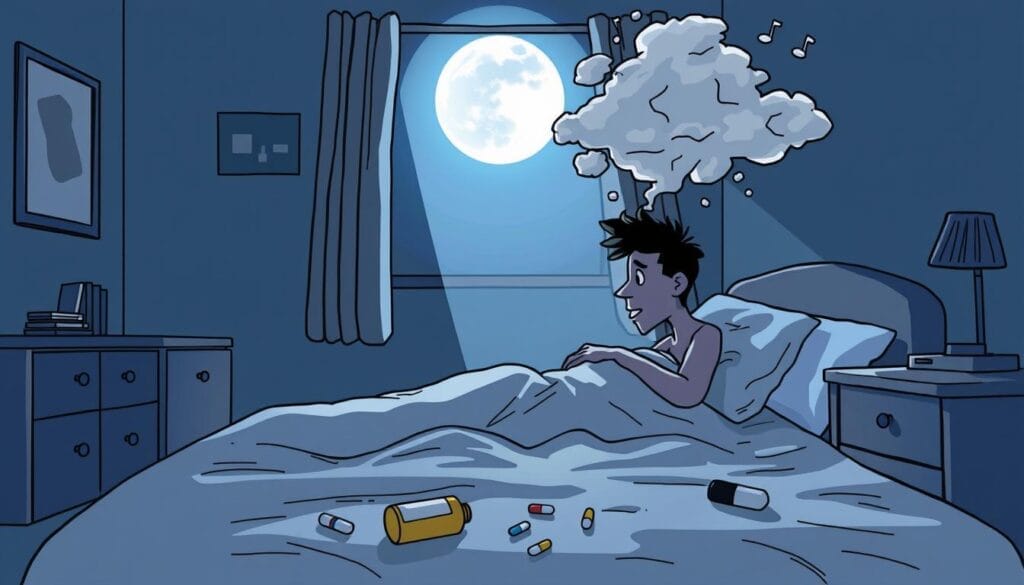
Underlying Neurological Conditions Linked to Sleep Disorders
Sleep disorders are closely tied to many neurological conditions. This creates a complex mix of symptoms and sleep problems. Parkinson's disease, Alzheimer's disease, and multiple sclerosis are three examples. They often come with sleep-related issues.
Parkinson's Disease
Parkinson's disease patients often feel very sleepy during the day. This is due to changes in sleep patterns and the effects of certain drugs. It also disrupts their nighttime sleep. The Parkinson's sleep issues greatly affect their quality of life.
Alzheimer's Disease
Alzheimer's disease patients often have trouble sleeping, known as Alzheimer's and insomnia. This can lead to cognitive decline and behavioral problems. Their sleep troubles may stem from the disease's neurological changes.
Multiple Sclerosis
People with multiple sclerosis often feel very tired and sleepy during the day. This can make everyday tasks hard and affect their well-being. The disease's effects on the brain can mess up their sleep-wake cycle, causing these symptoms.
It's important to understand how these neurological conditions and sleep disorders are connected. This knowledge helps in finding better ways to manage these issues. It can improve the lives of those affected.
Assessment Tools for Sleep Disorders
Managing sleep disorders in neurological patients needs a full check of their sleep and symptoms. Doctors use many tools to get both facts and feelings. This helps them find the right treatment. Here are some main ways to check sleep disorders:
Sleep Diaries
Sleep diaries are about what a person does at night. They write down bedtime, when they wake up, and how well they slept. Doctors use these to see sleep patterns and find problems.
Polysomnography
Polysomnography, or a sleep study, is the top way to find sleep disorders. It watches many things like brain waves and breathing while you sleep. It shows what's causing sleep problems, like sleep apnea.
Actigraphy Monitoring
Actigraphy uses a wrist device to track sleep and wake times. It looks at movement to guess how well you slept. It's good for seeing sleep patterns over time.
Using these tools together helps doctors understand sleep problems better. They can then make plans to help patients sleep better. This improves their life a lot.
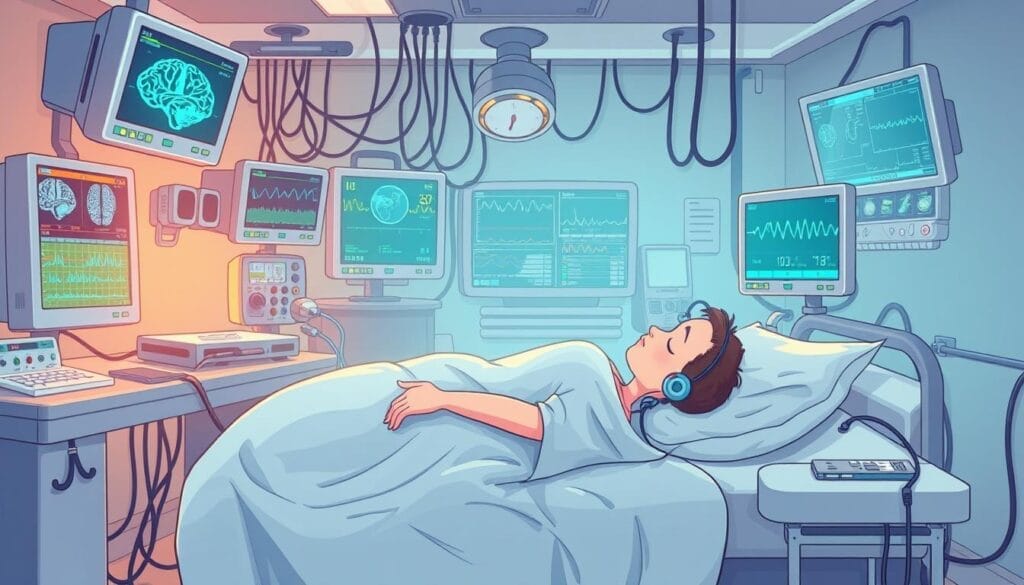
Treatment Options for Sleep Disorders
Treating sleep disorders in neurological patients needs a mix of medicines, therapies, and lifestyle changes. Medicines like benzodiazepines and Z-drugs help with insomnia but can lead to addiction. Cognitive Behavioral Therapy for Insomnia (CBT-I) is a top choice for treating insomnia.
Medications
Prescription sleep aids like eszopiclone (Lunesta) and zolpidem tartrate (Ambien) help with sleep. But doctors usually don't recommend them for long because of risks. Melatonin and natural remedies like valerian might also be tried, but their science backing is weak.
Cognitive Behavioral Therapy for Insomnia (CBT-I)
CBT-I creates a plan to fix sleep problems by changing thoughts and actions. It's as good as or better than sleep meds, making it a top pick for doctors.
Lifestyle Modifications
Healthy habits can greatly improve sleep. Keeping a regular sleep schedule and staying active are key. Limiting caffeine and alcohol and having a calming bedtime routine also helps. For those with neurological conditions, these tips need to be adjusted to fit their needs.
The Role of Sleep Hygiene
Good sleep hygiene is key for neurological patients to manage sleep disorders. It helps improve health outcomes. A consistent sleep routine, a restful environment, and avoiding stimulants can boost sleep quality and length.
Establishing a Sleep Routine
Having a regular sleep schedule is vital. Going to bed and waking up at the same time every day is important. It helps the body adjust its internal clock for better sleep.
Adding relaxing activities like light reading or gentle stretching to your bedtime routine helps signal to your brain that it's time to sleep.
Creating a Restful Environment
The sleep environment is crucial for quality sleep. A cool, dark, and quiet bedroom reduces outside distractions. A comfy mattress and pillows, and avoiding screens before bed, also help.
Limiting Stimulants
It's important to avoid or limit substances that can disrupt sleep. Caffeine, alcohol, and nicotine are stimulants that can make falling asleep hard. Alcohol might help you fall asleep but can wake you up later.
By being careful with these stimulants, neurological patients can sleep better and feel healthier.

Integrating Physical Activity into Sleep Management
Managing sleep disorders in neurological patients can be helped by adding [exercise for better sleep]. Physical therapy for sleep disorders has shown great results. Different exercises, like aerobic, strength training, and flexibility routines, can help improve sleep.
Types of Recommended Exercises
Moderate-intensity aerobic exercise can make sleep better and reduce insomnia and sleep-disordered breathing. Power lifting and active yoga also help by raising heart rate and aiding sleep. It's important to find what works best for each person.
Timing and Frequency
When you exercise can affect sleep. Studies show that exercising in the afternoon or early evening works best. This lets endorphins drop and the brain relax for sleep. Experts say 30 minutes of moderate exercise can improve sleep quality that night.
Monitoring Progress
- Keeping track of sleep with sleep diaries and actigraphy helps see how exercise affects sleep.
- Tracking sleep quality, duration, and other metrics helps make physical activity more effective for sleep.
Adding physical activity to a sleep plan is a strong tool for neurological patients. Choosing the right exercises, timing, and tracking progress are key. A well-rounded approach can greatly improve sleep quality and overall health.
The Importance of a Multidisciplinary Approach
Managing sleep disorders in neurological patients needs a team effort. A team of healthcare professionals works together. This team approach gives care that meets the complex needs of those with sleep issues linked to neurological conditions.
Collaboration with Neurologists
Neurologists are key in tackling sleep disorders linked to the brain. They understand the brain conditions that affect sleep, like Parkinson's or Alzheimer's. Working with neurologists helps healthcare teams create specific treatment plans for each patient.
Role of Psychologists
Psychologists focus on the mental side of sleep problems. They use cognitive behavioral therapy for insomnia (CBT-I) to teach patients good sleep habits. This helps manage the emotional and behavioral factors that cause sleep issues. Psychologists add a vital layer to treating sleep disorders in neurological patients.
Involvement of Sleep Specialists
Sleep specialists, like those in sleep medicine, are vital to the team. They do detailed tests to find out what sleep problems a patient has. They then suggest treatments like CPAP therapy or oral appliances to meet the patient's sleep needs.
Working together, the team ensures neurological patients get the best interdisciplinary sleep treatment. This team effort, with neurologist consultation and sleep medicine experts, is key for personalized, top-notch care. It greatly improves the health and well-being of these patients.

Challenges in Managing Sleep Disorders
Treating sleep disorders in neurological patients is complex. A big challenge is making sure patients stick to their treatment plans. This is hard for those with cognitive issues.
It's also tough to tell apart sleep disorders from neurological conditions. Sleep problems can be both symptoms and causes. So, figuring out the main issue is key.
Getting to sleep disorder resources can be hard in some places. This makes getting full care harder. Not having access to sleep experts adds to the problem.
To solve these issues, a team effort is needed. Neurologists, sleep specialists, and others must work together. They need to talk well, share ideas, and understand the patient's whole situation.
By tackling these problems, doctors can help patients with sleep disorders more. This leads to a better life, fewer symptoms, and better health.
Future Directions in Sleep Disorder Management
Researchers are working hard to understand how sleep disorders and brain health are linked. They are finding new ways to help people with these issues. Sleep disorder research is growing, helping us learn more about what causes them.
New technology is changing how we deal with sleep problems. Things like smart sleep trackers and online doctor visits are making it easier to get help. These tools help doctors and patients work together better.
There's also a push to teach patients more about their sleep issues. Online health tools, custom plans, and special programs are being made. They aim to make patients feel more in control and help them stick to their treatment plans.
FAQ
What are the most common types of sleep disorders affecting neurological patients?
Neurological patients often face six main sleep disorders. These include insomnias and sleep-related breathing disorders. Also, central disorders of hypersomnolence, parasomnias, sleep-related movement disorders, and circadian rhythm sleep disorders are common.
How do sleep disorders impact the overall health of neurological patients?
Sleep disorders can make neurological symptoms worse. They also harm cognitive function. This can lead to conditions like cardiovascular disease, diabetes, and depression.
What are the typical symptoms of sleep disorders in neurological patients?
Symptoms include trouble starting or staying asleep. Excessive daytime sleepiness is also common. These issues can affect daily life and quality of life.
How do specific neurological conditions contribute to sleep disorders?
Conditions like Parkinson's disease, Alzheimer's disease, and multiple sclerosis can cause sleep problems. They can also make sleep issues worse.
What are the key assessment tools used to diagnose sleep disorders in neurological patients?
To diagnose sleep disorders, sleep diaries, polysomnography, and actigraphy are used. These tools help accurately diagnose and monitor sleep disorders.
What are the most effective treatment options for managing sleep disorders in neurological patients?
Effective treatments include medications and cognitive behavioral therapy. Lifestyle changes and physical therapy exercises are also helpful. A team approach involving neurologists, psychologists, and sleep specialists is often needed.
How can good sleep hygiene practices help neurological patients with sleep disorders?
Good sleep hygiene practices are key. Keeping a regular sleep schedule and creating a good sleep environment are important. Avoiding stimulants before bed can also help.
What role does physical activity play in managing sleep disorders for neurological patients?
Physical activity, like aerobic exercises and strength training, can improve sleep quality. It's important to time exercises right to help sleep.
What are some of the key challenges in managing sleep disorders for neurological patients?
Challenges include getting patients to follow treatment plans. It's also hard to tell apart sleep disorder symptoms from neurological symptoms. Limited access to sleep resources and treatments is another issue.
How are advancements in research and technology shaping the future of sleep disorder management for neurological patients?
New research and technology are opening up more treatment options. They are also making current treatments more effective. Improved patient education is also playing a big role.
The Connection Between Sleep Deprivation and Cognitive Decline
Have you ever had a night where you barely slept and couldn’t focus the next day? Maybe your memory felt fuzzy, or you kept forgetting simple things. What you experienced isn’t just about being tired. It’s a real effect of your brain running on empty. Over time, missing sleep can seriously hurt how your brain works. That’s what this blog is all about, understanding the strong link between sleep deprivation and cognitive decline.
In this blog, we will explore how missing sleep affects the brain, what it does in the short and long run, how it connects to serious diseases like Alzheimer’s, and most importantly, how you can protect your brain by improving your sleep.
Understanding Sleep Deprivation
Sleep deprivation is a big problem today. It hurts our brains, memory, and how we think. It happens when we don't get 7 to 8.5 hours of sleep each night. This can be because of work, lifestyle, or sleep disorders.
Definition and Causes
Being awake for 24 to 72 hours is called acute total Sleep Deficiency. Chronic partial Sleep Deficiency means not getting enough sleep for many nights. Some people are more affected by sleep loss than others.
Common Symptoms
- Excessive sleepiness and fatigue
- Poor attention span and concentration
- Reduced adaptability and emotional control
- Impaired judgment and decision-making
Prevalence in Modern Society
About 32 to 39% of young and middle-aged adults sleep less than 7 hours a night. Chronic insomnia affects around 10% of people. Sleep problems are getting worse due to long work hours, busy lifestyles, and night shifts.
Read: Why Sleep Quality Matters More Than Sleep Quantity
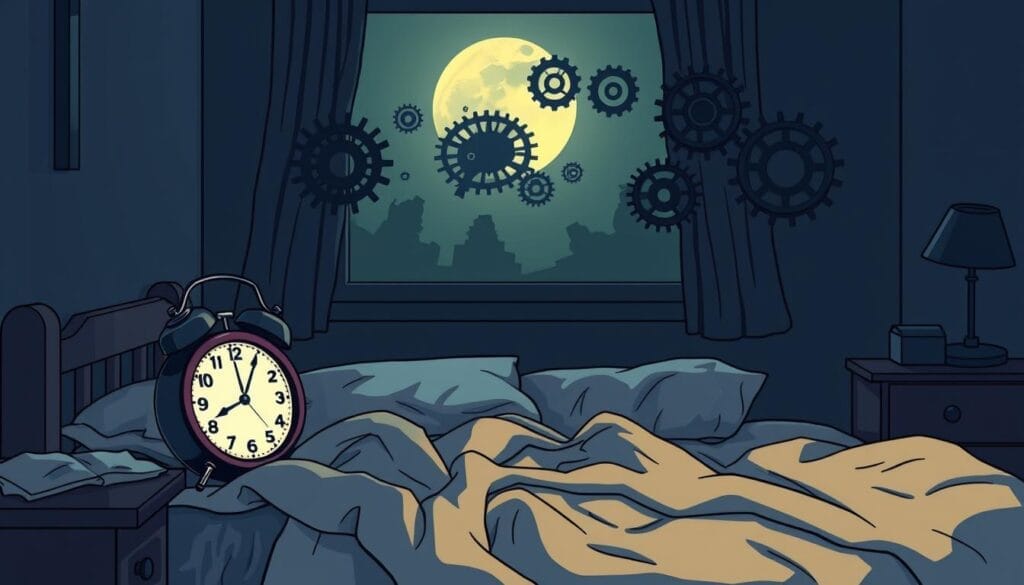
The Science of Sleep
During sleep, your brain goes through different stages. Each stage plays a special role in keeping your mind sharp and your memory strong.
- REM sleep helps with emotional balance and learning
- NREM (non-REM) sleep repairs brain cells and strengthens memories
- Deep sleep helps the brain clean itself
Here’s an amazing fact: According to the National Sleep Foundation, during deep sleep, the brain’s fluid system increases by 60%. This system flushes out waste proteins like amyloid-beta, which are linked to Alzheimer’s.
This cleaning process is done by something called the glymphatic system. Think of it as the brain’s janitor, sweeping out harmful trash while you sleep.
The brain also rewires itself during sleep. This is called brain plasticity. It helps you learn new things and remember them better. Without proper sleep, this doesn’t happen well.
Sleep Architecture and Cognitive Processing
Before we go deeper, let’s understand something called sleep architecture. This is the pattern of your sleep cycles each night. It includes the switch between light sleep, deep sleep, and REM sleep.
When sleep is interrupted, due to stress, noise, or health issues, this natural cycle breaks. The brain doesn’t get enough time in deep and REM sleep. That’s why you feel tired even after sleeping 7 hours with many wakeups.
Uninterrupted deep sleep and REM sleep are both needed for:
- Thinking clearly
- Solving problems
- Forming memories
So, good quality sleep is just as important as how long you sleep.
Read: Debunking the 8 Hour Sleep Rule: What You Need to Know

Studies show that bad sleep habits can harm our brain. People who sleep less than 8 hours often do worse on brain tests. Also, sleep problems like sleep apnea can increase the risk of brain issues like dementia. Sleep and brain health are closely linked, with many factors affecting this relationship.
Cognitive Functions Impacted by Sleep Deprivation
Sleep is key for our brain to work well. But, our busy lives often cut into our sleep. This can hurt our memory, problem-solving, and focus.
Memory Consolidation
Not getting enough sleep messes with how we remember things. It changes how our brain cells work in the hippocampus. This area is vital for keeping memories strong.
When we don't sleep well, it's harder to keep new memories. This is because our brain's ability to strengthen memories is affected.
Problem-Solving Abilities
Being able to solve problems and adjust when needed is important. But, not sleeping enough makes this harder. It's like our brain is foggy and can't adapt well.
This can lead to poor decisions and trouble solving complex problems. It's a big hit to our mental sharpness.
Read: 5 Yoga Poses for Better Sleep and Relaxation
Attention and Focus
Staying focused is key to getting things done. But, sleep loss can make it tough. We might find ourselves zoning out or even falling asleep without realizing it.
This can hurt our work, school, and even our safety. It's a big risk, especially when driving.
In short, not sleeping enough is bad for our brain. It messes with memory, problem-solving, and focus. We need to make sleep a priority for our brain's health.
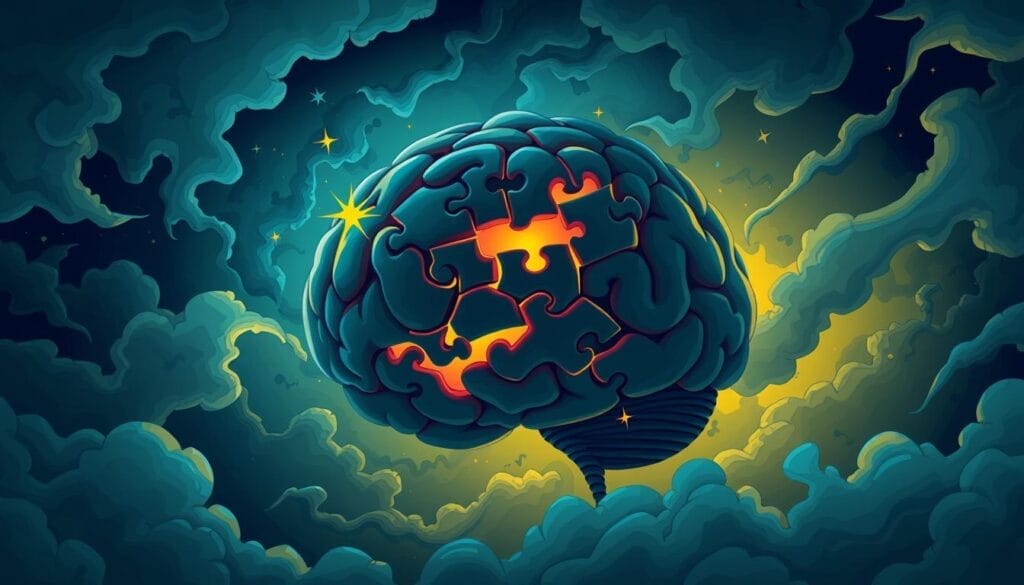
Long-Term Effects on Brain Health
Not getting enough sleep is bad for your brain. It can make you more likely to get Alzheimer's disease. Up to 15% of Alzheimer's cases might be because of not sleeping well.
Sleep helps clear out bad proteins from your brain. Just one night without sleep can make these proteins go up.
Poor sleep can also make your memory worse. It can lead to dementia. If you already have dementia, not sleeping well can make it worse.
Neurodegenerative Diseases
Not sleeping well can make you more likely to get Alzheimer's and other brain diseases. Sleep helps protect your brain. Without it, your brain can get damaged.
Studies show that sleep helps keep your brain healthy. Without it, your brain can start to die off.
Memory Disorders
Not sleeping enough can hurt your memory. It can make it hard to remember things. This is because sleep helps your brain remember.
Overall Cognitive Decline
Not sleeping well can affect your job and relationships. It can make it hard to make quick decisions. This is bad for jobs that need fast thinking.
It can also make you more likely to argue. It can make you less interested in healthy activities. And it can lead to depression over time.
Getting enough sleep is key to keeping your brain healthy. It can help prevent long-term brain problems. If you have trouble sleeping, see a doctor like Dr. Chandril Chugh.
Sleep Deprivation in Different Age Groups
Everyone needs sleep, but the amount and impact differ across ages. From kids to seniors, sleep plays a key role in thinking, learning, and remembering.
Children and Teens: Impact on Learning
Kids need more sleep than adults. But screens, school stress, and poor routines often steal that time.
- Less sleep means poor focus in class
- They may forget what they learn
- Performance in exams and homework drops
Lack of rest also interferes with memory consolidation, the brain’s process of saving new facts.
Adults: Productivity and Decision-Making
Most working adults are sleep-deprived. But they may not notice how it affects their choices.
- Increased mistakes and missed deadlines
- Bad decision-making
- Trouble managing emotions and stress
This is the impact of sleep deprivation on mental performance, and it can lead to burnout over time.
Elderly: Sleep and Risk of Dementia
Older adults may sleep less deeply. But that doesn’t mean they need less sleep.
- Light, broken sleep increases the risk of dementia
- They may nap more during the day and sleep less at night
- Poor sleep can worsen conditions like Alzheimer’s or neurodegeneration
For the aging brain, sleep and brain health go hand in hand. It’s quality that matters most.

Everyone needs to focus on sleeping well for their brain. Doctors can help by finding ways to improve sleep for different ages. This helps keep brains healthy and sharp.
Lifestyle Factors Contributing to Sleep Deprivation
Getting a good night's sleep is key for healthy sleep patterns. But, many lifestyle choices can lead to sleep deprivation. Stress, mental health issues, too much tech before bed, and tough work and school schedules are big problems.
Stress and Mental Health
Stress and mental health problems like anxiety and depression hurt sleep. They make it hard to fall and stay asleep. This poor sleep quality causes more fatigue and concentration issues, making stress and mental health worse.
Technology Use Before Bed
Electronic devices like phones and computers give off blue light. This light messes with our natural sleep cycle and melatonin levels. Too much screen time before bed is a big reason for sleep deprivation.
Work and School Schedules
Busy work and school schedules, especially shift work or early starts, cause sleep loss. This affects our ability to sleep well and focus during the day.
By tackling these lifestyle issues, we can improve our sleep and overall health. This boosts our cognitive function and daily performance.
How to Improve Sleep and Protect Brain Health
Even if you’ve had years of poor sleep, it’s never too late to make things better. Small changes can lead to big improvements in how your brain functions.
Healthy Sleep Hygiene Tips
Creating a peaceful bedtime routine can help your brain fall into healthy sleep patterns.
- Sleep and wake up at the same time daily
- Keep the bedroom cool, dark, and quiet
- Avoid screens one hour before bed
- Skip caffeine after 2 p.m. and limit alcohol
These steps help fix your sleep architecture naturally and improve rest.
Read: 11 Tips for Better Sleep Hygiene
Cognitive and Lifestyle Interventions
Your daily habits affect how well you sleep at night.
- Exercise during the day boosts deep sleep
- Meditation lowers stress and supports brain calm
- Playing puzzles or memory games helps mental sharpness
- Foods rich in magnesium, melatonin (like bananas or nuts) support better rest
This way, you improve sleep and support your cognitive function at the same time.
Read: 5 Natural Remedies for Better Sleep Quality
The Role of Nutrition in Sleep Quality
Nutrition is key in managing sleep deprivation and cognitive decline and brain health. Foods high in tryptophan, magnesium, and melatonin help sleep. But, caffeine and alcohol can mess with sleep for hours.
Foods That Promote Sleep
Eating high-protein foods with amino acids can help sleep. Also, foods with low glycemic index and fruits full of antioxidants are good. But, eating too close to bedtime can ruin sleep.
The Impact of Caffeine and Alcohol
Caffeine, found in many drinks and foods, hurts sleep. It keeps you awake for hours. Alcohol might make you sleepy at first but can mess up sleep later.
Supplements for Better Sleep
Supplements like melatonin, valerian root, and magnesium might help sleep. But, talk to a doctor before taking them. They work differently for everyone.
In short, eating right, avoiding caffeine and alcohol, and using supplements wisely can improve [Sleep Deprivation and Cognitive Decline] and [Brain Health].
Seeking Professional Help for Sleep Issues
If sleep problems keep you awake at night, it's time to see a specialist. People with chronic insomnia or too much daytime sleepiness need help. Sleep experts can guide you through issues like insomnia, sleep apnea, narcolepsy, and restless leg syndrome.
When to Consult a Specialist
See a sleep specialist if sleep issues last more than a few weeks. They can help if your health is suffering. These experts can find the cause and create a treatment plan just for you.
Types of Sleep Disorders
Sleep disorders include many conditions, each with its own symptoms. Insomnia makes it hard to fall or stay asleep. Sleep apnea causes breathing pauses, leading to tiredness during the day.
Treatment Options Available
Treatment for sleep disorders depends on the condition. Cognitive behavioral therapy for insomnia (CBT-I) helps change negative thoughts and behaviors. For sleep apnea, CPAP therapy keeps airways open, helping you breathe better at night.
FAQ
What is the connection between sleep deprivation and cognitive decline?
Not getting enough sleep can hurt your brain. It makes it hard to remember things and solve problems. It also affects your focus and mental sharpness.
What are the common symptoms of sleep deprivation?
Feeling very tired and having trouble paying attention are signs. It also makes you less adaptable and affects your mood. This can hurt your work or school performance and make things unsafe.
How prevalent is sleep deprivation in modern society?
Many people don't get enough sleep today. This is because of long work hours and wanting to have fun. Most people sleep between 7 and 8.5 hours a night, but many don't get that much.
What is the importance of REM sleep?
REM sleep is key for handling emotions and remembering things. It's when your brain works like it does when you're awake. It helps you process what you learned during the day.
How does sleep deprivation affect memory consolidation and problem-solving abilities?
Not sleeping well messes with how you remember things. It changes how your brain works. It also makes it harder to solve problems because your brain isn't as flexible.
What is the link between sleep deprivation and neurodegenerative diseases?
Not sleeping enough can lead to Alzheimer's disease. It's thought that up to 15% of Alzheimer's cases are caused by poor sleep. Sleep helps remove bad proteins from your brain, and missing out on sleep can make these proteins build up.
How does sleep deprivation affect different age groups?
Kids and teens are really affected by not sleeping well. It can hurt their school work and growing up. Adults might not do as well at work and could be more likely to have accidents. Older adults are more likely to see their thinking skills get worse because of not sleeping.
What lifestyle factors contribute to sleep deprivation?
Stress, too much tech before bed, and busy schedules can all cause sleep problems. These things can make it hard to sleep and make stress worse, creating a cycle.
What strategies can help improve sleep quality?
Going to bed and waking up at the same time every day helps. Making your bedroom a sleep place and using relaxation techniques can also improve sleep.
When should someone seek professional help for sleep issues?
If you can't sleep well and it's affecting your life, see a sleep doctor. They can help with problems like insomnia, sleep apnea, and restless leg syndrome.
Why Sleep Quality Matters More Than Sleep Quantity
Sleep is key for our survival. For years, we've focused on how much we sleep. But now, we see how good our sleep is just as important.
Studies show we sleep less now than before. But, some countries' sleep times haven't changed much since 2004. This shows we might be getting used to less sleep.
A big study in 1989 found sleep problems can lead to mental health issues. This shows how sleep quality affects our health. Now, we think sleep quality is more important than how long we sleep.
We're learning more about why good sleep is so important. Just sleeping a lot doesn't mean you're getting quality rest. The real value of sleep comes from how well it makes us feel refreshed and ready for the day.
Understanding Sleep Quality
Sleep quality is key to good health. It's not just about how long you sleep. It also includes how well you sleep.
Good sleep quality means falling asleep fast, sleeping all night, and feeling refreshed in the morning. It's about being satisfied with your sleep.
What Is Sleep Quality?
Good sleep quality means falling asleep in 30 minutes. You should sleep all night without waking. You should spend more time sleeping than trying to sleep.
Getting 7-9 hours of sleep is important. Your sleep should match your natural rhythm. You should feel rested and satisfied with your sleep.
Factors Influencing Sleep Quality
Many things can affect your sleep quality. These include your age, culture, screen time, and stress. Knowing these factors helps improve your sleep.
Researchers found four key elements for sleep quality. These are Sleep Latency, Awakenings, Wake After Sleep Onset, and Sleep Efficiency. They studied 277 research studies on sleep quality.
Doctors use patient answers and sleep tests to check sleep quality. Tests like polysomnography (PSG) help diagnose sleep disorders. They give insights into sleep quality.
Knowing about sleep quality and its factors is important. It helps improve sleep health and well-being. By focusing on sleep cycles and quality, you can enhance your sleep and enjoy its benefits.
The Impact of Poor Sleep Quality
Good sleep is key for health and happiness. But, many people don't get enough quality sleep. This affects their body and mind a lot.
Effects on Physical Health
Poor sleep can harm your body. It makes you tired, weakens your immune system, and can mess with your skin. It also stresses your heart and can make you gain weight.
Effects on Mental Health
Poor sleep also hurts your mind. It makes you feel tired, moody, and hard to control your feelings. This can make things worse, creating a bad cycle.
Long-term Consequences
Long-term, poor sleep is very bad. It can lead to serious diseases like diabetes, high blood pressure, and heart disease. It can even cause depression and Alzheimer's.

It's important to know how bad poor sleep is. By understanding the risks, we can work on getting better sleep. This helps us stay healthy and happy.
Sleep Quantity vs. Sleep Quality
Getting enough sleep is important, but it's not just about how long you sleep. The quality of your sleep matters a lot too. Adults need 7-9 hours of sleep each night.
Defining Sleep Quantity
Sleep quantity is how many hours you sleep each night. The CDC says over a third of American adults don't get enough sleep. Experts say adults need 7-9 hours, with women needing more because of sleep disorders.
How Quality Trumps Quantity
Sleep quality is more important than how long you sleep. It includes sleep stages, alertness, and how well you sleep. Even if you sleep long enough, bad sleep quality can harm you.
Good sleep habits are key for health. Keep a regular sleep schedule, avoid screens before bed, and make your sleep space comfy. This helps you sleep well every night.
Benefits of High-Quality Sleep
Getting good sleep is key for both mind and body. It boosts your thinking skills, mood, and physical strength. These are just a few perks of sleeping well.
Enhanced Cognitive Function
Quality sleep is vital for your brain. It makes you more focused, sharp, and able to remember things better. People who sleep well do better at tasks that need quick thinking and solving problems.
Not sleeping enough can hurt your brain power. It can make you less productive.
Improved Mood and Emotional Well-being
Sleep affects how you feel. Good sleep makes you happier and helps you handle stress better. Bad sleep can lead to feeling anxious or depressed.
Better Physical Performance
Good sleep is also good for your body. It keeps your immune system strong, your skin healthy, and your heart in good shape. It also helps control hunger and keeps your metabolism balanced.
For athletes, it's crucial for recovery and improving their game.
Quality sleep has many benefits. It improves your thinking, mood, and physical health. By valuing sleep, you can reach your full health potential.

How to Measure Sleep Quality
Getting good sleep is key for our health. Many find it hard to measure their sleep quality. Sleep quality is as important as how much we sleep.
There are tools and devices to help understand and improve sleep quality. They give us valuable insights.
Tools and Devices for Tracking
Measuring sleep quality can be done in two ways. We can rate how we feel after waking up. Or, we can use devices and sleep studies for a detailed look.
- Sleep tracking devices, like fitness trackers and smartwatches, track sleep stages and efficiency. They help find ways to get better sleep.
- Polysomnography, done in a sleep lab, analyzes sleep patterns. It looks at brain waves, eye movements, and breathing. It gives a full picture of sleep quality.
Understanding Sleep Cycles
Knowing your sleep cycles is key to measuring sleep quality. We go through four sleep stages each night. Each stage helps our body and mind rest.
Using sleep tracking devices or getting a professional check can help. It gives us the info to make changes for better health.
Common Sleep Disorders
Sleep disorders can really hurt how well you sleep and your health. Insomnia is a big one, making it hard to fall or stay asleep. It can make you tired during the day, change your mood, and hurt your thinking skills.
Sleep apnea is another big problem. It makes you stop breathing a lot during sleep. This breaks up your sleep and can hurt your heart.
Insomnia and Its Effects
Insomnia is very common, with over 80 types. Most adults need 7-8 hours of sleep each night. But insomnia can mess with this.
Things like caffeine, alcohol, and weird work hours can cause insomnia. It can make you tired, hard to focus, and change your mood. It also raises the chance of accidents.
Sleep Apnea Explained
Sleep apnea is a big sleep problem. It happens when your airway blocks during sleep, stopping and starting your breathing. Loud snoring, feeling very tired during the day, and heart problems are signs.
To find out if you have sleep apnea, you might need a sleep study. Doctors might suggest a CPAP machine to keep your airway open.
Other Disorders Impacting Sleep Quality
- Restless Leg Syndrome (RLS): A neurological condition that makes you want to move your legs a lot, disrupting sleep.
- Narcolepsy: A sleep disorder that makes you very sleepy during the day and can make you fall asleep suddenly.
- Circadian Rhythm Disorders: Problems with your body's clock, making it hard to sleep and wake up at the right times.
These and other sleep disorders can really mess with your sleep. They can lead to health problems. Getting help and finding ways to improve your sleep is key for feeling better.

Strategies for Improving Sleep Quality
Improving sleep quality takes many steps. You can start by making your sleep space better. Also, having a regular sleep schedule and healthy habits help a lot. These steps can make you sleep better and feel great.
Optimizing Your Sleep Environment
A comfy sleep space is key. You need a good mattress and dark curtains. Keep your room cool, around 65°F to 70°F. Also, less noise helps you sleep better.
Establishing a Sleep Routine
Being consistent is important. Go to bed and wake up at the same time every day. This helps your body get into a rhythm. Try not to nap too much during the day.
Lifestyle Changes to Enhance Sleep
Changing your lifestyle can also help. Cut down on caffeine, especially in the evening. Exercise is good, but not right before bed. Also, avoid screens before bed to avoid blue light.
Using these tips can really help. Improve your sleep space, stick to a routine, and live healthier. You'll sleep better and feel better too.
Learn more about the importance of sleep quality in brain health
The Role of Nutrition and Exercise
Good nutrition and regular exercise are key for quality sleep. Some foods help sleep better, and exercise improves sleep quality. Knowing how nutrition, exercise, and sleep connect helps improve health and well-being.
Foods That Promote Better Sleep
Foods with tryptophan, magnesium, and melatonin aid sleep. Milk, bananas, nuts, and cherries are good for sleep. Eating light before bed and avoiding caffeine and alcohol also helps sleep.
Impact of Physical Activity on Sleep Quality
- Regular exercise boosts sleep quality by helping you fall asleep faster and sleep deeper.
- Adults who exercise for 30 minutes a day sleep 15 minutes longer than non-exercisers.
- Moderate exercise, like brisk walking or swimming, helps those with insomnia sleep better.
But, intense exercise before bed can keep you awake. So, when you exercise matters for good sleep.

Adding a balanced diet and exercise to your day improves sleep and health. It's a step towards better sleep and overall well-being.
Mindfulness and Sleep
Getting good sleep is key for feeling well in body and mind. Mindfulness helps a lot with this. Meditation, a big part of mindfulness, makes sleep better and cuts down on insomnia.
Benefits of Meditation for Sleep
Mindfulness meditation can really help with insomnia and make sleep better. It relaxes you, lowers stress and anxiety. This makes it easier to fall asleep and sleep better.
It also makes sleep more efficient, longer, and less disturbed. This is great for getting a good night's rest.
Techniques for Relaxation Before Bed
- Deep Breathing Exercises: Slow, deep breathing calms you down before bed.
- Progressive Muscle Relaxation: Tensing and releasing muscles helps release tension.
- Guided Imagery: Imagining calm scenes helps quiet your mind for sleep.
Adding these mindfulness techniques to your bedtime routine can greatly improve your sleep. It makes for a more restful and refreshing night.
Importance of Sleep Hygiene
Sleep hygiene is about the habits that help you sleep well. It's key for quality sleep and health. Knowing about sleep hygiene and following certain practices can greatly improve your sleep.
Defining Sleep Hygiene
Sleep hygiene includes habits and environment that affect sleep quality. It's about having a regular sleep schedule and a cozy sleep space. Good sleep hygiene leads to better sleep and health.
Practices to Maintain Good Sleep Hygiene
Good sleep hygiene means following certain practices. These help you sleep well and feel refreshed. Here are some:
- Go to bed and wake up at the same time every day.
- Have a calming routine before bed, like reading or a warm bath.
- Make sure your bedroom is cool, dark, and quiet.
- Don't use phones or computers before bed.
- Don't drink caffeine, nicotine, or alcohol close to bedtime.
- Exercise during the day but not before bed.
- Use relaxation techniques like deep breathing to manage stress.
By following these good sleep habits, you can sleep better. This improves your thinking, health, and overall happiness.
Seeking Professional Help
Many sleep problems can be fixed with lifestyle changes and better sleep habits. But, some cases need a doctor's help. If you often can't sleep well or feel tired during the day, see a sleep specialist.
Snoring a lot, gasping while sleeping, or feeling very tired during the day also means you might need a doctor. These signs can show serious sleep problems.
Treatment Options for Sleep Issues
There are many ways to treat sleep problems. Cognitive behavioral therapy for insomnia (CBT-I) is one. Sleep specialists can create plans to help with sleep quality issues.
People with depression or anxiety might find CBT-I helpful. It can really improve their symptoms.
Seeing a sleep specialist is key if you have ongoing or serious sleep issues. They can find the cause of your sleep problems. Then, they can help you get better sleep and feel better overall.
FAQ
What is the importance of sleep quality?
Sleep quality is more important than how long you sleep. Good sleep quality lets your body go through all needed sleep stages. This helps your body and mind get fully rested.
What factors influence sleep quality?
Many things can affect how well you sleep. These include your age, culture, screen time, and stress. Making your sleep space better and sticking to a sleep schedule can help.
What are the effects of poor sleep quality?
Bad sleep quality can harm your health. It can make you tired, weaken your immune system, and affect your skin. It can also lead to heart problems, depression, and memory loss.
How does sleep quality differ from sleep quantity?
Sleep quantity is how long you sleep each night. Sleep quality is about how well you sleep. It includes how easy it is to fall asleep and how refreshed you feel in the morning.
What are the benefits of high-quality sleep?
Good sleep is great for your mind and body. It boosts your thinking skills, mood, and immune system. It also makes your skin better and helps your heart stay healthy.
How can sleep quality be measured?
There are ways to check how well you sleep. You can tell how you feel in the morning. Or, you can use devices to track your sleep stages and how well you sleep.
What are common sleep disorders that impact sleep quality?
Sleep disorders like insomnia and sleep apnea can hurt your sleep quality. They can make it hard to sleep well and lead to health problems.
How can sleep quality be improved?
To sleep better, make your sleep space comfy. Stick to a sleep schedule and avoid caffeine and alcohol. Mindfulness practices like meditation can also help.
When should someone seek professional help for sleep issues?
If you often can't sleep or feel tired all day, see a sleep specialist. They can help you find ways to sleep better and feel more rested.
The Role of Play in Cognitive Development
Play is key in building trust and is full of empowering and connecting moments. It helps overcome fear and teaches important social skills. Through play, kids grow their emotional and thinking abilities.
Play is when kids choose what to do and follow their own rules. It's filled with imagination. Different kinds of play include moving around, building things, using language, pretending, and playing games.
For a growing brain, the benefits of play in cognitive development are too important to ignore.
In this blog, we will break down what cognitive development really means, how different types of play affect the brain, and why making time for playful learning should be non-negotiable for every child. We’ll also explore proven research, expert-backed recommendations, and tips you can start using right now.
Understanding Cognitive Development
Before diving into play, it helps to understand what’s happening in a child’s brain as they grow. Let’s simplify this complex process.
What is Cognitive Development?
Cognitive development means how a child learns, remembers, solves problems, and understands the world. It includes attention, memory, language, and logic.
Key stages of cognitive development (Piaget’s theory):
| Stage | Age Range | Key Developments |
|---|---|---|
| Sensorimotor | 0–2 years | Learns by touching, seeing, hearing |
| Preoperational | 2–7 years | Begins using language, imagination forms |
| Concrete Operational | 7–11 years | Understands rules and logic |
| Formal Operational | 12+ years | Thinks abstractly and plans ahead |
Brain areas involved in cognition:
- Prefrontal cortex: Focus and decision-making
- Hippocampus: Memory building
- Temporal lobe: Language skills
- Cerebellum: Coordination and thinking speed
The brain’s structure supports learning through play. This is where the benefits of play in cognitive development begin to shine.
Why the Early Years Matter
Children’s brains are most flexible in the first few years. This is when learning is fastest—and play has the biggest impact.
According to the Harvard Center on the Developing Child, the brain forms 700 new neural connections per second during early childhood.
- These connections shape future learning and behavior.
- Play helps form, strengthen, and prune these neural pathways.
- Delays or limits in playful activities can reduce learning speed.
So, the earlier we tap into the benefits of play in cognitive development, the better the long-term results.
The Science Behind Play and Brain Growth
Play isn’t just fun, it’s biological. Let’s look at how the brain responds to play activities.
How Play Stimulates Brain Function?
Play triggers activity in brain regions that control memory, attention, and emotional balance. It changes the brain physically and chemically.
- Stimulates synaptic growth: Playing strengthens brain connections.
- Boosts dopamine: Play activates the brain’s reward system.
- Supports curiosity: Encourages exploration and creativity.
- Unstructured vs structured play:
- Unstructured play = child-led, open-ended (more beneficial for imagination)
- Structured play = adult-led with specific rules (helps with discipline and teamwork)
Even five minutes of open play can improve problem-solving and focus.
Neuroscientific Insights
Brain imaging gives us proof that play changes brain function.
- MRI scans show pretend play increases prefrontal cortex activity.
- Executive function improves: planning, control, switching tasks.
- Studies confirm that pretend play and learning go hand in hand.
- Brain scans from the University of Arkansas and University of Wisconsin prove:
- Imaginative play boosts working memory.
- Symbolic play leads to stronger language networks in the brain.
These findings reinforce the benefits of play in cognitive development in a visible way.

The Different Types of Play and Their Impact on Cognitive Skills
Different types of play shape different skills. Let’s explore how each kind supports cognitive growth through play.
Pretend Play (Imaginative Play)
This type includes role-playing, make-believe, and using imagination to create stories.
- Boosts abstract thinking and flexible thinking.
- Encourages problem-solving and planning.
- Builds social understanding and theory of mind.
A study in the Journal of Experimental Child Psychology showed that children who engaged in pretend play scored higher in verbal fluency.
Pretend play is the core of early childhood cognitive development.
Read: Lack of Protein in Indian Diet: Causes, Symptoms, and Solutions
Constructive Play (Building, Drawing)
This includes puzzles, blocks, crafts, and drawing.
- Improves spatial reasoning.
- Teaches sequencing and planning.
- Supports math thinking, patterns, and geometry.
Even stacking cups or drawing shapes can spark brain development.
Physical Play (Running, Climbing)
Active play supports physical and mental coordination.
- Boosts motor planning and balance.
- Enhances focus and attention span.
- Improves response inhibition and brain-body control.
Children who play physically show better performance in class, especially in tasks needing memory and quick thinking.
Social Play (Group Games, Roleplay)
Playing with others teaches emotional and mental skills.
- Develops language through dialogue.
- Teaches sharing, negotiation, and turn-taking.
- Helps kids read emotions and respond properly.
The benefits of play in cognitive development extend to emotional regulation too.
Digital Play: A Modern Consideration
With screens now a part of childhood, digital play must be understood and used wisely.
Pros:
- Some educational games build vocabulary and logic.
- Interactive stories can support memory and comprehension.
Cons:
- Passive screen time limits creativity.
- Too much digital input reduces outdoor play.
So, what counts as healthy digital play?
- Under 2 hours a day
- Educational, problem-solving games
- Involves interaction, not just watching
Digital games can support play and brain development when used thoughtfully
The Benefits of Play in Cognitive Development
Now let’s talk about the real results. These are the most talked-about benefits of play in cognitive development.
Memory and Attention Improvements
Games like Simon Says or memory card games can boost short-term and working memory.
- Improves attention span and listening
- Helps with faster recall
- Trains the brain to store and retrieve info quickly
Children who engage in play-based tasks show 20% better memory retention, according to a study by Stanford University.
Enhancing Problem-Solving and Creativity
Play lets kids try, fail, and figure things out without pressure.
- Open-ended tasks promote divergent thinking
- Less fear of failure encourages more attempts
- Builds planning and strategic thinking
Creative children scored 50% higher in divergent thinking tests (Journal of Applied Developmental Psychology).
Better Language and Communication
Language is best learned through stories, dialogue, and imitation.
- Storytelling during play builds vocabulary
- Repetitive games enhance speech fluency
- Roleplay strengthens grammar and sentence use
This is one of the underrated benefits of play in cognitive development.
Emotional Intelligence and Self-Regulation
Play helps children manage emotions and behavior.
- Teaches waiting turns, sharing, and adjusting to others
- Builds impulse control
- Encourages self-soothing and patience
Play literally teaches kids how to behave in the real world.
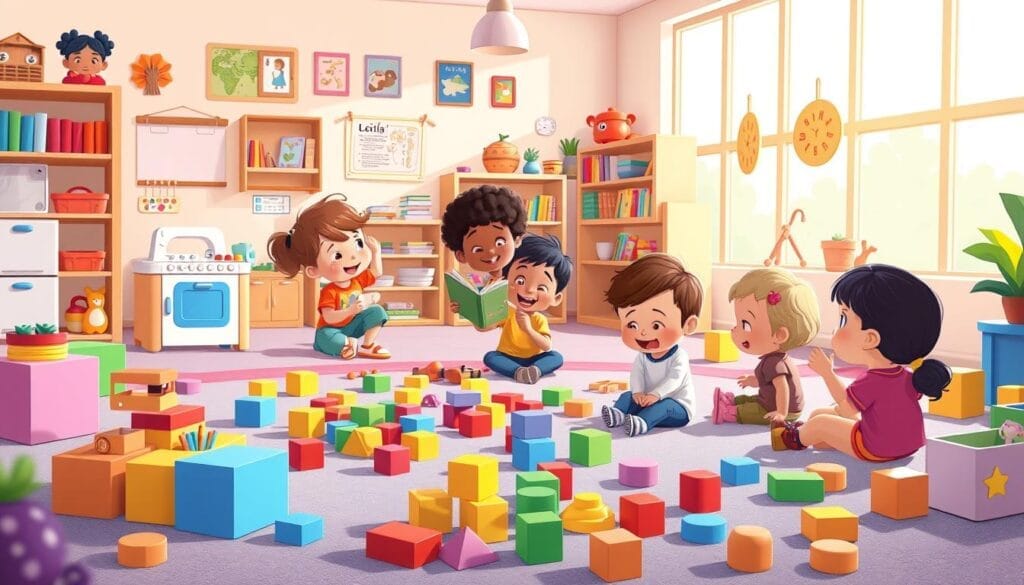
Play as a Tool for Emotional Regulation
Play is key for kids to learn about feelings and control them. It helps them understand and share their emotions in a good way. Pretend play lets kids safely try out different feelings and learn to care about others.
Understanding Emotions Through Play
Kids get to act out feelings like sharing or feeling happy or mad during play. This helps them know their own feelings and see others' too. The playful learning strategies in these activities help kids grow emotionally smart.
Building Resilience and Coping Strategies
Play helps kids become strong and learn to deal with tough times. When they face problems in play, they learn to solve them and handle their feelings. This play's impact on executive functions helps them manage their emotions for life.
Play is a powerful way to help kids grow in all areas. It supports their thinking, social, and emotional growth.
Read: How Stress Affects Brain Development in Children
The Impact of Unstructured Play
Unstructured play, or free play, is great for kids' brains. It lets them explore and create freely. This helps them think creatively and solve problems on their own.
It also helps them learn to make choices and control their actions. This is key for growing up smart.
Benefits of Free Play
Free play helps kids learn important social skills. They learn to work together and solve conflicts. It also boosts their confidence and creativity.
Plus, it makes them love learning. All these things are good for their minds.
Encouraging Creativity and Imagination
Creating a space for kids to play freely is important. It lets them use their imagination and play on their own terms. Outdoor play is especially good for kids.
It helps them grow strong and happy. It's good for their bodies and minds.
Play is essential for kids to grow well. It helps them with physical skills and emotional control. It's important to balance play with learning activities.
This way, kids can grow up smart and happy. Parents and teachers play a big role in this.
Role of Structured Play in Learning
Structured play is key for kids' brains to grow. It includes games and activities that teach specific skills. Kids learn in fun ways, like through games and puzzles.
By playing, kids get better at school stuff. They think more clearly and remember things better.
Educational Games and Activities
Games like board games and puzzles are great for kids. They teach kids to follow rules and work together. Kids learn new things and get better at solving problems.
Goal-Directed Play
Structured play also means activities like sports and coding. Kids aim to get better at something new. This helps them set and reach goals.
Play like this is super important for kids. It makes them smarter and better at solving problems. It's all about learning in a fun way.
Play and the Development of Executive Functions
Play is key in growing executive functions. These include skills like working memory and planning. Kids learn to plan and make decisions through play.
Understanding Executive Functions
Executive functions help us plan and remember things. They are important for school and life success. These skills let us handle many tasks at once.
How Play Strengthens Self-Control
Social play makes kids better at self-control. They learn to share and follow rules. Pretend play also helps kids control their impulses.
Research shows play is vital for learning. Kids who control their impulses do better in school. They are also better at social skills.
Play-based programs help young kids grow. The "Building Brains and Futures" program shows great results. It improves language and motor skills.

Social Benefits of Play in Cognitive Development
Play has many social benefits that help a child grow. It teaches them to make friends, share, and work together. These skills help them understand others and solve problems.
Building Relationships Through Play
Playing with friends helps kids learn important social skills. They learn to take turns and share. This builds their emotional smarts and helps them deal with tough social situations.
Cooperation and Teamwork
Playing together teaches kids to work as a team. They learn to compromise and solve problems together. These skills are key for success in school and work later on.
Play is vital for a child's growth, including their brain development. It teaches them how to make friends and work well with others. These skills are important for life.
Play in Different Cultural Contexts
Play looks different in every culture. It shows the unique values and traditions of each place. Yet, play is a key part of learning for kids everywhere.
Studies show that play helps kids learn about their culture. It also helps them get along with others and think on their feet. By looking at how play changes, we can learn more about how kids grow up.
Variations in Play Practices
Most research on play comes from Europe and the US. It talks about how play helps kids grow up. But, in other parts of the world, like Guatemala, play is seen as just part of growing up.
In Papua New Guinea, kids learn by doing real tasks. They help with food and home chores. This is how they learn early on.
How people see play's role in growing up varies a lot. For example, in Cameroon, kids play in many ways, like hunting and making clothes. But in Europe, playing rough with dads is seen as important for bonding.
Even though play looks different everywhere, it's a big part of being human. It shows how kids are the same all over, but also how they are shaped by their culture.
Cross-Cultural Benefits of Play
Play is found in every culture where kids are studied. It shows that play is a universal part of being human. But, it's shaped by where we grow up.
Girls and boys play differently, everywhere. Boys like to play in big spaces and move a lot. Girls often play in smaller groups and focus on social things.
How much time kids have to play changes a lot. In some places, kids help out a lot. But in others, they have lots of space to play freely.
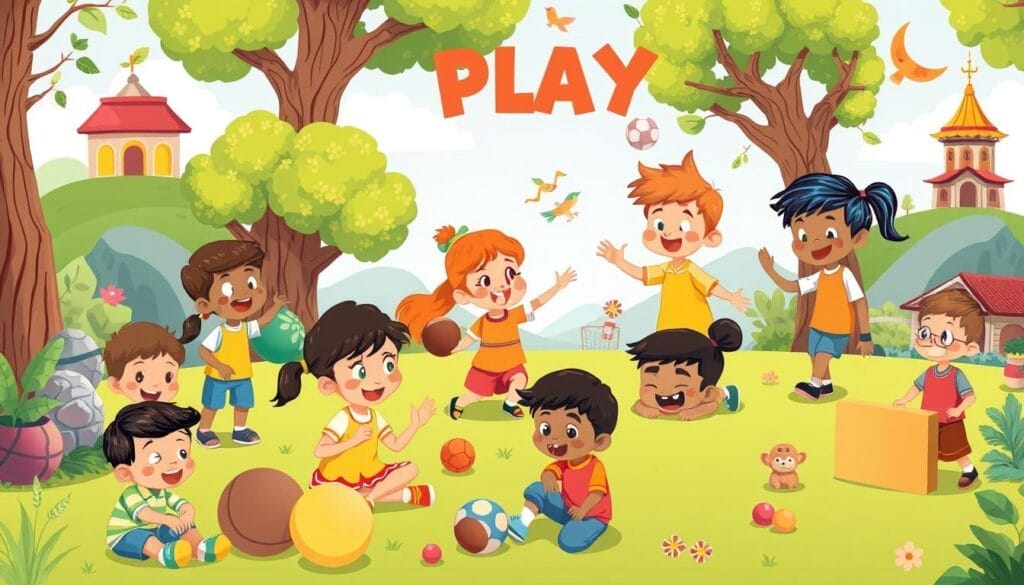
Most studies on play are from Western countries. But, we need to learn more about play in different places. This helps us make better rules for kids, especially in diverse places.
Studies that Prove the Power of Play
What does the science say? These studies confirm the brain-boosting effects of play.
Landmark Studies in Child Development
- Tools of the Mind Curriculum – Based on Vygotsky’s theories
- Play-based learning improved focus, memory, and academic scores
- University of Cambridge Study (2022)
- Found structured pretend play led to higher language and math scores in 4-year-olds
- National Institute for Play Findings
- Emphasized play as essential to human development
These programs prove that the benefits of play in cognitive development are more than a theory, they’re reality.
Global Guidelines from Experts
World Health Organization (WHO)
- Recommends at least 3 hours of play daily for children under 5
UNICEF
- Play is a right, not just an activity
American Academy of Pediatrics (AAP)
- "Play is essential to development."
- Pediatricians are encouraged to prescribe play during visits
These global bodies agree that early childhood cognitive development is impossible without play.
Practical Tips for Parents and Educators to Encourage Cognitive Play
Here’s how to add more cognitive-rich play into your child’s day.
Age-Wise Play Recommendations
| Age Range | Suggested Play Types |
| 0–2 yrs | Sensory bins, stacking, peek-a-boo |
| 2–5 yrs | Roleplay, drawing, building blocks |
| 5–8 yrs | Rule-based games, puzzles, cooperative board games |
Match play to the child’s developmental stage to get maximum benefit.
Create a Brain-Enriching Play Environment
- Keep screens off during play
- Use toys that don’t have only one right answer
- Let kids get bored, it leads to imagination
- Provide a safe, open space to explore freely
Play should be easy to access, not something scheduled.
Role of Adults in Play
- Let children lead the game
- Ask guiding questions (“What happens next?”)
- Teachers should use scaffolding, gently guiding, not controlling
Adults help direct attention without stealing creativity.
Need Expert Advice? Consult Dr. Chandril Chugh Today
Understanding the science is one thing. Applying it to your child’s needs is another. If you want to ensure your child grows smarter through play, don’t guess, get expert advice.
Dr. Chandril Chugh is a US-trained, board-certified neurologist. He treats memory issues, sleep problems, migraines, stroke recovery, and pediatric ADHD. His expertise in early childhood cognitive development helps parents create smarter, happier futures for their kids.
Book a direct consultation with Dr. Chandril Chugh and learn how to maximize the benefits of play in cognitive development for your child.
FAQ
What is the role of play in cognitive development?
Play is key for kids' brain growth. It helps them learn and grow in many ways. Kids solve problems, learn new words, and control their feelings through play.
How does play contribute to different stages of cognitive development?
Kids go through different stages of brain growth. Play helps them at each stage. It prepares them for learning and solving problems later on.
What types of play are most effective in stimulating cognitive growth?
Many types of play help kids grow. Sensory, constructive, and social play are all good. They help kids solve problems, learn new words, and control their feelings.
How does play enhance problem-solving skills?
Play makes kids think and find solutions. It teaches them to be creative and keep trying. These skills help them do well in school and life.
What is the relationship between play and language development?
Play, especially language play, helps kids learn words. It lets them try out new sounds and words. This improves how they talk and communicate.
How does play contribute to emotional regulation and social-emotional skills?
Play helps kids deal with feelings in a safe way. It teaches them to be kind and understand others. This builds their strength and how they handle tough times.
What are the benefits of unstructured play?
Free play lets kids explore and create freely. It helps them make choices, solve problems, and be creative. It's great for their brain and imagination.
How does structured play contribute to cognitive development?
Structured play, like games, teaches important skills. It helps kids learn to follow rules and work together. This boosts their brain power.
What is the role of play in the development of executive functions?
Play, especially with others, teaches kids to plan and make decisions. It helps them control themselves and work well with others. These skills are very important for the brain.
How do the social benefits of play contribute to cognitive development?
Social play helps kids make friends and work together. It teaches them to see things from others' viewpoints. This is key for understanding and feeling emotions.
How does play vary across different cultures, and how does this impact cognitive development?
Play looks different in every culture. But, it always helps kids grow and learn. It teaches them about their culture and how to adapt to new situations.
What does research say about the benefits of play in cognitive development?
Many studies show play is good for kids' brains. It helps with self-control, social skills, and overall brain growth. Experts say we should make play a big part of learning.
Debunking the 8 Hour Sleep Rule: What You Need to Know
Do you really need 8 hours of sleep every night? Many believe this is a strict rule for good health, but is it true for everyone?
People often feel confused or frustrated when they can't meet this “8 hour sleep rule”. Poor sleep or misinformation can make life harder, especially for busy adults juggling work, family, and health.
In this blog, we will explain why the 8 hour sleep rule is not the same for everyone. We will explore how much sleep you really need and what matters most for your health. Understanding these facts can help you improve your sleep and overall well-being.
Where Did the 8-Hour Rule Come From?
The idea that everyone needs exactly 8 hours of sleep is very popular. But where did it come from?
Let’s look at the history and what science says.
Origins of the 8 Hour Sleep Recommendation
In the late 1800s, Robert Owen suggested the "8-8-8" rule. It said to work 8 hours, play 8 hours, and rest 8 hours a day.
The 8 hour sleep rule was popularized during the Industrial Revolution.
- Factory workers were expected to work 8 hours and sleep 8 hours, with 8 hours for other activities.
- This schedule was more about work than health.
- It became a simple rule that spread widely.
- It ignored individual sleep needs.
- It shaped modern society's view on sleep needs.
This framework was more about fitting work and life schedules than true health needs. Yet, the 8 hour sleep rule stuck around for generations.
Cultural Perspectives on Sleep
Different cultures view sleep differently. A 2020 Sleep Medicine study showed some societies value polyphasic sleep (multiple short sleeps) over one long sleep.
- Mediterranean cultures often include siestas.
- Some Asian cultures prioritize short naps for energy.
- Western focus on 8 hours sleep rule is not universal.
These differences show sleep is personal, not universal.
What Science Actually Says?
Science shows that sleep needs vary from person to person. A study in Sleep journal found that adults need 7–9 hours of sleep, but some function well with less, while others need more.
- The National Sleep Foundation says 7–9 hours is a general guide.
- Some people thrive for 6 hours, others need 10.
- Genetics and lifestyle play a big role.
Let’s dive into why 8 hour sleep rule doesn’t work for everyone.

How Much Sleep Do You Need? Individual Variability in Sleep Needs
Everyone’s sleep needs are different. Factors like age, genetics, and lifestyle influence how much sleep is best for you. You shouldn’t feel bad if you don’t match the 8 hour sleep rule perfectly.
Sleep Needs by Age and Life Stage
| Age Group | Recommended Sleep Duration |
| Adults (18-64) | 7 to 9 hours |
| Older Adults (65+) | 7 to 8 hours |
| Teenagers | 8 to 10 hours |
| Children | 9 to 12 hours |
- Sleep needs decrease slightly with age.
- Younger people generally need more sleep to support growth and brain development.
- Adults in busy phases of life may need to adjust based on fatigue and health.
Again, the 8 hour sleep rule is just a rough estimate, not a hard requirement. Your age sets a starting point, but other factors matter too. Knowing your life stage helps guide your sleep schedule.
Lifestyle Influences on Sleep
Your daily life affects sleep. A 2017 Sleep Medicine study found stress and activity levels change sleep needs.
- Busy professionals may need more rest.
- Athletes require extra sleep for recovery.
- Caregivers often face disrupted sleep.
So sticking to 8 hour sleep rule might not be practical for everyone.
Genetic Factors in Sleep Patterns
Genes can make you a “short sleeper” or “long sleeper.” A study found some people naturally need less sleep due to the individual variation in genetic makeup.
- About 1% of people have a short-sleep gene.
- Others need 9+ hours to feel rested.
- Your genes shape your optimal sleep duration.
Lifestyle and genes mean your “optimal sleep duration” may not be the same as others.
Quality vs. Quantity: What Matters More?
Sleep is not just about hours or following the 8 hour sleep rule. The quality of sleep is often more important than how long you sleep.
Sleep Cycles and Their Importance
Sleep happens in 90-minute cycles, including light, deep, and REM stages. A 2018 Sleep study found 4–6 cycles per night is ideal.
- Light sleep prepares your body for rest.
- Deep sleep repairs muscles and boosts energy.
- REM sleep supports memory, learning, and mood.
Missing cycles can make you feel tired, even if you follow 8 hour sleep rule. Better sleep quality leads to better health, even if you sleep fewer hours.
Read → Finding The Ideal Room Temperature For Sleep

It's important to tackle sleep disorders and focus on quality sleep. Knowing the effects of sleep loss helps us improve our sleep. This boosts our health and happiness.
Alternatives to the 8 Hour Sleep Rule
| Alternative | Description | Considerations | Best For |
| Power Naps | Short naps taken during the day, typically 20–30 minutes. |
| Busy professionals needing mid-day recharge |
| Polyphasic Sleep | Multiple short sleep sessions across 24 hours. |
| People with non-traditional lifestyles |
| Customized Sleep Schedules | Sleep schedules based on individual needs and lifestyle. |
| Anyone seeking optimal personal sleep pattern |

Finding the right sleep balance is key. It's about quality and quantity, tailored to you. By trying out different sleep methods, you can improve your sleep habits and health.
Myths That Could Be Ruining Your Sleep
Many sleep myths cause confusion and prevent healthy rest.
Busted: Alcohol as a Sleep Aid
- Alcohol may make you fall asleep faster.
- But it reduces REM sleep and causes frequent awakenings.
- Leads to poor sleep quality and next-day tiredness.
Alcohol is not a true sleep aid. This worsens sleep even if you meet the 8 hour sleep rule.
Napping Myths
- Short naps (20-30 minutes) can boost alertness.
- Long naps may disrupt nighttime sleep.
- Naps are not bad if timed right and do not replace nighttime sleep.
Well-timed naps can replace gaps in the 8 hour sleep rule, but overdoing it may harm your routine.
Sleep Tracker Anxiety
- Many use sleep tracking devices hoping for better sleep.
- These can cause stress if you obsess over data.
- Sleep tracking devices are not always accurate.
- Focus on how you feel rather than just numbers.
Even following the 8 hour sleep rule won’t help if sleep quality is poor or disrupted.
When Poor Sleep Becomes a Health Risk?
Not getting enough good sleep can affect your body and mind in many ways.
Short-term Effects You Can Feel
Even one bad night can hurt. A 2023 Sleep study showed poor sleep impairs focus and mood.
- You feel irritable or forgetful.
- Reaction times are slow, risking accidents.
- Energy drops, making tasks harder.
These effects hit fast and disrupt your day.
Long-Term Health Consequences
Chronic sleep loss raises serious risks.
- Increased risk of heart disease, diabetes, and obesity.
- Higher chances of developing neurological problems like memory loss.
- Sleep deprivation effects include weakened brain function.
Poor sleep can seriously impact your health over time.
Psychological Effects of Sleep Loss
The neurological impact of poor sleep affects mental health. A 2021 Neurology study found sleep loss increases anxiety and depression.
- Stress worsens with poor sleep.
- Memory and decisions suffer.
- Mood swings become common.
Sleep is key for a healthy mind.
How Tech and Screens, and Social Media Affect Sleep Cycle?
In today’s digital world, technology affects our sleep in ways many don’t realize. Even if you try to follow the 8 hour sleep rule, late-night scrolling makes it harder to fall asleep.
How Blue Light Disrupts Melatonin?
- Blue light from phones, tablets, and computers stops melatonin production.
- Melatonin is a hormone that helps you fall asleep.
- Exposure before bedtime delays sleep onset and reduces quality.
Reducing blue light helps maintain your circadian rhythm.
Digital Detox Techniques
- Set a “no screens” time at least one hour before bed.
- Use night mode or blue light filters on devices.
- Replace screen time with relaxing activities like reading or meditation.
Digital detox supports better sleep health.
Also Read → The Impact of Smartphone Use on Sleep Patterns
Tips to Improve Sleep Architecture
- Maintain a consistent sleep schedule every day.
- Avoid caffeine or heavy meals close to bedtime.
- Create a quiet, dark, and cool sleep environment.
- Practice good sleep hygiene, such as turning off screens before bed.
- Avoid alcohol which can disrupt REM and deep sleep.
Improving how you sleep can be more helpful than just sleeping longer.
Know More → Relationship Between Caffeine and Sleep Quality
When Should You See a Sleep Specialist?
If you're following the 8 hour sleep rule and still feel tired, something deeper may be wrong. Some sleep problems need expert attention. Knowing when to consult a neurologist or sleep doctor is important.
Common Sleep Disorders
Here are some common sleep disorders you should watch
- Insomnia: difficulty falling or staying asleep.
- Sleep apnea: pauses in breathing during sleep.
- Restless legs syndrome: uncomfortable leg sensations that interrupt sleep.
These conditions need diagnosis and treatment.
If you are struggling, let Dr. Chandril Chugh help you find your best sleep routine today → Book a consultation for expert, personalized care.

Personalized Sleep is More Important Than Following Myths
The 8 hour sleep rule is a helpful guide but not a strict requirement for everyone. Your sleep needs depend on many factors including age, lifestyle, and genetics.
Focusing on sleep quality vs sleep quantity is vital. Good sleep supports your brain, body, and mental health. Understanding your unique needs is better than chasing a hour sleep rule blindly.
If you are still struggling with sleep, consult a neurologist or sleep expert. Together, you can find your optimal sleep duration and improve your sleep habits for a healthier life.
FAQ
What is the 8-hour sleep rule?
The 8-hour sleep rule is a common guideline. But, it doesn't fit everyone. Sleep needs change with age, lifestyle, and genes. Studies now say sleep quality is more important than how long you sleep.
Where did the 8-hour sleep recommendation come from?
Scientists found that eight hours of sleep is best for our brains and bodies. But, humans used to sleep in two parts, called biphasic sleep, in the past.
How does sleep quality affect overall health?
Good sleep quality is more important than how long you sleep. Sleep stages are key for rest. To sleep better, keep a regular sleep schedule, make your sleep area comfy, and relax before bed.
How do individual factors influence sleep needs?
Sleep needs change with age and lifestyle. Babies need up to 17 hours, while older adults need less. Work, stress, and exercise also affect sleep. Genes influence our natural sleep patterns.
What are the consequences of sleep deprivation?
Not sleeping enough hurts our brains, mood, and body. It can lead to heart disease, obesity, and diabetes. It also makes us stressed, anxious, and depressed.
Are there alternatives to the 8-hour sleep rule?
Short naps can help us feel better. Some people sleep in short periods all day, but it's not well studied. Tailoring sleep to fit your life and body type can work better.
What are some common myths and misconceptions about sleep?
Many think everyone needs 8 hours of sleep. But, this isn't true for everyone. Drinking alcohol before bed doesn't help sleep. Napping can be good if done right. But, some sleep aids can harm us in the long run.
How does technology affect sleep patterns?
Screens can mess with our sleep by blocking melatonin. Sleep trackers can help but also worry some people. Avoiding screens before bed helps sleep better.
When should someone seek professional help for sleep issues?
If you have trouble sleeping, like insomnia or sleep apnea, get help. Doctors can offer treatments like therapy or machines. Sleep studies can find sleep disorders. Getting help is key if sleep problems affect your life.
How to Create a Bedtime Routine for Adults That Promotes Brain Health
A consistent bedtime routine is key for good brain health and overall well-being. The U.S. Centers for Disease Control and Prevention says 33% of adults in the U.S. don't get enough sleep. This can harm their brain and thinking skills.
Most adults know sleep is important, but not everyone understands just how much it matters for the brain. That’s where a good bedtime routine for adults can make all the difference.
In this blog, we will explain how you can build a healthy bedtime routine for adults that supports brain health, improves memory, and helps you feel mentally sharp every day.
Why Does Brain Health Depend on a Bedtime Routine for Adults?
When your brain doesn’t get enough rest, it slows down. Simple tasks feel harder. Focus becomes fuzzy. Memory slips. Sleep isn’t just a break, it’s brain work in action.
According to the CDC, 1 in 3 adults don’t get enough sleep. That means many people are walking around with brains that are not working at full power.
Sleep helps your brain:
- Clear out waste through the glymphatic system (like a nighttime cleaning crew)
- Save important memories (memory consolidation at night)
- Reset mood and emotions for the next day
- Support deep thinking and problem-solving
A good bedtime routine for adults is like giving your brain a nightly tune-up
What Time Should Adults Go to Bed for Optimal Brain Health?
Your body follows a natural clock, called the circadian rhythm. Going to bed at the same time every night helps your brain get the deep sleep it needs.
NIH research found that adults with regular sleep times scored higher on memory tests than those with irregular schedules.
Best Bedtime Windows:
- Between 9:30 PM and 11:00 PM for most adults
- Keep a consistent schedule, even on weekends
When you shift your sleep schedule often, your brain can’t settle. It’s like trying to switch time zones every few days.
What Are the Key Steps in a Brain-Boosting Bedtime Routine for Adults?
Creating a strong bedtime routine for adults helps your brain relax and prepare for sleep. Think of it as a series of calming steps that tell your brain: “It’s time to rest now.”
How Can You Use Light and Dark to Reset Your Brain’s Sleep Clock?
Your brain responds to light. Bright lights at night confuse your body clock. Dimming lights helps your brain produce melatonin, the hormone that makes you sleepy.
- Turn off screens at least 1 hour before bed
- Use lamps or red spectrum lighting in the evening
- Try blue light blocking glasses if you must use screens
This sets the melatonin cycle correctly so your brain knows it's time to sleep.
Read: The Impact of Smartphone Use on Sleep Patterns
What Activities Calm the Brain Before Bed?
Calm activities help lower stress hormones like cortisol. This tells your brain that it’s safe to sleep.
- Light journaling to process your thoughts
- Reading a book (paper, not digital)
- Quiet breathing or meditation
- Gentle stretches or mindfulness
These habits prepare your brain for deep sleep.
Which Foods and Drinks Help or Harm Your Sleep?
What you eat and drink in the evening affects your brain’s ability to fall asleep.
Avoid:
- Caffeine after 2 PM (coffee, chocolate, energy drinks)
- Alcohol before bed, it disrupts sleep quality
- Heavy meals late at night
Helpful choices:
- Magnesium-rich foods: almonds, spinach, bananas
- Herbal teas: chamomile, valerian, lavender
- Warm milk or a small banana for natural sleep support
These help with sleep hygiene and overall brain relaxation.
Can a Nightly Digital Detox Improve Brain Recovery?
Yes, screen time within 30 minutes of bed leads to 50% more sleep problems. The brain stays alert because of the light and content stimulation.
Try replacing screen time with:
- Puzzles or crosswords
- Coloring or sketching
- Listening to soft music or nature sounds
A proper nighttime routine for adults keeps technology out of the bedroom.
Why is a Cool, Dark, Quiet Environment Best for Brain Health?
Your brain needs the right setup to get into deep, healing sleep.
Ideal Sleep Conditions:
- Room temperature between 60–67°F
- Blackout curtains or eye masks
- White noise machines or earplugs if needed
This environment supports neurological sleep health by promoting deeper sleep cycles.

How Much Sleep Do Adults Need to Protect Cognitive Function?
The average adult needs 7–9 hours of sleep every night. Anything less harms memory, mood, and mental clarity.
Long-term sleep loss raises your risk of Alzheimer’s and other brain disorders.
Sleep Duration vs. Brain Health Risk:
| Sleep Hours | Cognitive Health Impact |
|---|---|
| Less than 6 | High risk of memory problems |
| 6–7 | Moderate brain fatigue |
| 7–9 | Best for mental performance |
| More than 9 | May signal poor sleep quality |
Getting enough sleep is part of your brain health bedtime tips.

The Impact of Exercise on Sleep Quality
Regular physical activity greatly improves sleep quality. It makes sleep last longer and feel better. Doing at least 30 minutes of moderate exercise can boost slow wave sleep. This is key for refreshing the brain and body.
But, when you exercise matters. Exercising too close to bedtime can mess with sleep. The endorphins from exercise can wake up your brain, making it hard to sleep if you do it too late.
The Best Times to Exercise for Better Sleep
Exercise's effect on sleep varies by person. But, studies say morning or afternoon exercise is best. This is because your body temperature goes up during exercise. Then, it drops, helping you feel sleepy.
Types of Exercise to Consider
- Moderate to vigorous exercise can improve sleep quality for adults. It helps you fall asleep faster and stay asleep longer.
- Yoga, light stretching, and breathing exercises are great for sleep, especially in the evening.
- Evening workouts can lead to more slow-wave sleep. This means you fall asleep quicker and sleep deeper.
The exact link between exercise and sleep is still a mystery. But, it's clear they're connected. A mix of exercise and good sleep habits can greatly improve your health and happiness.
What Role Does Consistency Play in Your Bedtime Routine?
Being consistent is the most important part of any bedtime routine for adults. Your brain thrives on patterns.
The suprachiasmatic nucleus, your body’s master clock, regulates your brain’s daily rhythm.
A study found that adults who followed a fixed bedtime for just 3 weeks showed major improvements in memory, focus, and morning alertness.
![]()
Are Naps Good or Bad for Your Brain at Night?
Short naps are okay, but long or late naps can mess up your nighttime sleep.
Smart Napping Rules:
- Keep naps under 30 minutes
- Nap before 3 PM
- Use naps to recharge, not replace sleep
This supports your adult sleep schedule without disturbing your nighttime sleep cycle.
How Can Stress Management at Night Support Brain Health?
Stress raises cortisol, a hormone that blocks sleep and hurts memory.
Healthy Evening Stress Tools:
- Gratitude journaling (write 3 good things from the day)
- Progressive muscle relaxation (tense and relax body parts)
- Warm shower or bath to soothe nerves
APA reports that over 30% of adults suffer stress-related insomnia. Managing this improves sleep and mental performance.
Can Sleep Supplements Support a Healthy Bedtime Routine for Adults?
Supplements can help, but not all are safe or effective. It’s best to talk to a doctor first.
Common Supplements:
- Melatonin (helps reset sleep cycles)
- Magnesium (calms nerves)
- L-theanine (supports relaxation)
Avoid over-the-counter sleep pills unless prescribed. Stick to natural tools or get advice from a specialist.
What Are Common Mistakes That Disrupt a Bedtime Routine for Adults?
Some habits can undo all your efforts. Watch out for these common slip-ups.
- Watching exciting TV shows or scrolling on the phone in bed
- Eating big meals or drinking caffeine late
- Staying up extra late on weekends
- Bringing work or stress into bed
These lower your chances of memory consolidation at night and hurt sleep cycles.
Sample Brain-Healthy Bedtime Routine
Here's a simple bedtime routine for adults that supports brain health:
| Time | Activity | Purpose |
| 9:00 PM | Dim lights, turn off screens | Trigger melatonin production |
| 9:15 PM | Light reading or journaling | Calm the mind |
| 9:30 PM | Herbal tea or warm water | Soothe body |
| 9:45 PM | Meditation or breathing | Lower stress and cortisol |
| 10:00 PM | Lights off, quiet environment | Support deep sleep cycles |
Repeat this nightly to train your brain.
When Should You See a Neurologist or Sleep Specialist?
Sometimes sleep problems need professional help. If you’ve tried routines but still feel tired, it’s time to seek advice.
Signs to Watch For:
- Frequent waking at night
- Brain fog, memory issues, or mood swings
- Trouble falling or staying asleep
A trained neurologist expertised in sleep disorders can check for deeper issues and help you build a better sleep plan. Book a consultation with Dr. Chandril Chugh to explore personalized help.
Ready to Sleep Smarter? Consult Dr. Chandril Chugh Today
If you're serious about building a bedtime routine for adults that truly supports brain health, you don't have to do it alone. Dr. Chandril Chugh is a US-trained, board-certified neurologist with deep experience in treating sleep-related brain issues like memory loss, poor focus, and neurological fatigue.
Don’t wait until poor sleep affects your daily life. Reach out to Dr. Chugh today to build your personalized sleep routine.
FAQ
What is a bedtime routine, and why is it important for brain health?
A bedtime routine is a set of activities done 30-60 minutes before sleep. It helps the body and mind get ready for rest. It makes you feel tired at bedtime.
Good routines can make you sleep better. They also help with memory, reduce stress, and keep your brain working well.
How does a consistent sleep schedule benefit the brain?
Staying consistent with sleep times helps your brain cycle better. It also makes sure you get enough deep sleep. This is key for brain health and memory.
It also helps control hormones like cortisol and melatonin. These hormones help you stay awake and sleepy.
What are the key elements of an effective bedtime routine?
A good bedtime routine starts with a calm-down period. Make your bedroom sleep-friendly. Avoid screens before bed.
Try relaxation techniques, have a light snack, and stick to the same bedtime every day. This helps your brain get ready for sleep.
How can I set a regular sleep schedule?
Choose the same bedtime and wake-up time every day. This helps your body's clock stay in sync. Use alarms to keep on schedule.
Regular times help your brain know when it's time to sleep and wake up.
How can I limit screen time before bed?
Stop using screens at least an hour before bed. Instead, read a book, listen to music, or do relaxation exercises. Blue light filters or glasses can also help.
These steps can improve your sleep quality a lot.
What mindfulness practices can help improve sleep?
Mindfulness like meditation, deep breathing, or muscle relaxation can reduce stress. They help your mind relax before sleep.
These practices lower your heart rate and blood pressure. This makes it easier to fall and stay asleep.
How does nutrition affect sleep quality?
Some foods can help you sleep better, while others can keep you awake. Light snacks like fruits or nuts are good. Cherries, grapes, and kiwi also help.
Herbal teas, especially chamomile or lavender, can make you sleepy. But avoid heavy meals, alcohol, and caffeine close to bedtime.
How does exercise impact sleep quality?
Exercise can make your sleep better and deeper. This is good for your brain and health. But, don't exercise too close to bedtime.
Try yoga, stretching, or a short walk in the evening instead. This is better for your sleep.
How can I manage stress and anxiety before bed?
Use mindfulness, deep breathing, or muscle relaxation to manage stress and anxiety. Journaling can also help. Writing down tomorrow's tasks can ease your mind.
These activities can lower your stress levels and help you sleep better.
What elements are important for a sleep-conducive bedroom environment?
A good bedroom has a comfy mattress and pillows. Use blackout curtains or masks to block light. White noise machines or earplugs can also help.
The room should be cool, between 65-70°F (18-21°C). This helps your brain make melatonin and sleep better.
How can I measure the effectiveness of my bedtime routine?
Keep a sleep journal to track your routine's success. Note your bedtime, wake time, and sleep quality. Also, any sleep disturbances.
Use this info to see patterns and adjust your routine. Sleep apps or devices can give more detailed data.
When should I seek professional help for sleep issues?
If you have ongoing sleep problems, you might need a sleep specialist. Look for signs like chronic insomnia or loud snoring.
A professional can offer personalized advice and treatments. They can help with underlying sleep issues.
The Role of Storytelling in Child Development Psychology
Storytelling is a key tool in child development psychology. It helps grow young minds in many ways. Kids learn new words and understand the world better through stories.
Studies show that stories keep kids' brains active longer than just looking at pictures. This makes storytelling a special way to help kids think, feel, and speak better.
We will look at how storytelling has helped kids for a long time. It boosts their thinking, feelings, and speaking skills. By using stories, we can help kids learn and grow in amazing ways.
Introduction to Storytelling and Its Importance
Storytelling is a special art that uses words and actions to share stories. It makes the listener use their imagination. Unlike reading books, it doesn't need printed materials and involves looking directly at the listener.
Child development psychology studies how kids grow from babies to teenagers. It finds that storytelling is key for their growth in many ways.
Definition of Storytelling
Storytelling is the art of telling stories with words, voice, and body. It lets the storyteller and the listeners work together to understand the story. This makes storytelling a dynamic and interactive experience.
Overview of Child Development Psychology
Child development psychology looks at how kids and teens change. It covers many areas like thinking, speaking, feeling, and moving. Storytelling helps kids grow and learn as they reach different milestones.
Studies show storytelling affects kids' brains and development. Near-infrared spectroscopy (NIRS) shows kids' brains work hard when they listen to stories. This shows storytelling's impact on their minds and bodies.
Historical Context of Storytelling
Storytelling has been key to human culture for ages. It has crossed borders and changed with time. From old tales told by mouth to today's digital stories, it has helped share values and history. Knowing how storytelling has changed helps us see its big role in growing kids.
Traditional Storytelling in Various Cultures
Different cultures have used stories to keep their identity alive. Elders would tell tales to kids, sharing their worldviews and traditions. These oral traditions helped pass down important cultural values.
Evolution of Storytelling Methods
Storytelling has changed a lot over time. It moved from just talking to writing and now to digital stories. The printing press made sharing stories easier. Today, stories include videos, games, and social media, reaching more kids than ever.
This change in how stories are told has greatly affected kids. From old tales to new digital ones, stories shape kids' minds and hearts. They help kids learn and grow in many ways.
Cognitive Development Through Storytelling
Storytelling is key in shaping kids' minds. Studies show that stories light up kids' brains. They process language, emotions, and more.
This activity makes kids feel good. It helps them remember stories better.
Enhancing Language Skills
Stories introduce kids to new words and ways of speaking. A study in Developmental Psychology found a link. Kids who heard more complex stories did better in school.
Fostering Critical Thinking
Stories help kids think critically. They follow plots, understand characters, and guess what happens next. This sharpens their minds.
Stories teach kids to be strong and flexible. They learn to face challenges and adapt.
Storytelling does more than just improve language skills. It boosts social skills, creativity, and emotional understanding. Kids learn to see things from others' viewpoints. This makes them more open and better communicators.
Emotional and Social Development
Storytelling is key for kids' emotional and social growth. It lets them see different views and feelings through stories. This helps them understand and feel for others.
Building Empathy and Understanding
Stories let kids see things from different characters' points of view. They feel their happiness, sadness, and struggles. This helps kids learn to care about others' feelings.
By seeing things from others' eyes, kids get a better grasp of life. They start to connect with their friends better.
Strengthening Social Skills
Stories also boost kids' social skills. They learn to share, listen well, and share their thoughts. These skills help them make friends and deal with others.
Through stories, kids get better at talking, solving problems, and working together. This prepares them for life's social challenges.

Storytelling as a Tool for Education
Storytelling makes learning fun and effective for kids. It helps teachers explain hard ideas in a way that's easy to get. Studies show it really helps students learn better.
Engaging Young Learners
Stories grab the attention of young kids, making them excited to learn. Books can cut down on boredom in kids by up to 30%. Teachers use stories to teach new things, check if students get it, and encourage thinking.
Integrating Storytelling in Curriculums
Adding stories to lessons makes learning more fun. Stories fit into many subjects like history, science, and language. They help students remember and understand better because they connect ideas to stories.
Using stories in teaching makes learning fun and interactive. It boosts learning engagement, helps mix different subjects, and supports educational storytelling. This tool is great for growing young minds.
Benefits of Interactive Storytelling
Storytelling is great for kids, and interactive stories are even better. They make learning fun and help kids remember more. This is because they get to join in and learn by doing.
Participatory learning makes stories more exciting. It helps kids remember what they learn. This is because they are part of the story.
Encouraging Participation
Interactive stories let kids help tell the story. This makes them feel more creative and confident. They can guess what happens next or change the story a bit.
It turns them from just listening to being part of the story. They feel like they own the story.
Enhancing Retention and Recall
Studies say interactive stories help kids remember better. When they're involved, they remember more. This is because they're not just listening.
They're part of the story. This makes learning stick with them longer.
Interactive stories mix fun with learning. They help kids grow smarter and more creative. They also build their confidence and happiness.

The Role of Parents and Caregivers
Parents and caregivers are key in helping children grow. Research shows that when moms talk more during book time, kids learn better. This helps kids read and understand books better as they get older.
Storytelling Practices in the Home
Storytelling at home is great for kids. It helps them learn to read and speak better. Parents can read books, tell stories, and let kids make up their own tales.
Encouraging Independent Story Creation
Letting kids tell their own stories is good for them. It makes them creative and helps them think critically. This way, kids learn and grow in a fun way.
The Abu Dhabi Early Childhood Authority (ECA) says storytelling is key for kids. Programs like the Anjal Z Program show how important it is. Tools like the Storybutton and Storytailor.ai help kids learn through stories.
Storytelling and Cultural Identity
Storytelling is very important for keeping cultural heritage alive. It helps children understand their roots and grow their identity. Stories from the past teach us about our values and traditions.
Preserving Heritage Through Stories
Storytelling helps pass down cultural knowledge and traditions. It connects children to their family's history and traditions. This way, they learn to appreciate their cultural identity.
Influencing Identity Formation
Stories shape who we are. They help children understand their culture and place in the world. These stories teach us values and help us navigate our heritage.
Studies show family stories are good for kids. They help with social, emotional, and language skills. Using props or tech makes these stories more fun and memorable for kids.

In short, storytelling is key for keeping culture alive and helping kids grow. It connects us to our past and shapes our identity. Storytelling is a powerful way to share our heritage with the next generation.
The Therapeutic Benefits of Storytelling
Storytelling is a key tool in child development psychology, especially in counseling. It lets kids share and deal with their feelings in a safe way. It connects their inner world with the outside.
Storytelling in Counseling Settings
In counseling, storytelling helps kids see their experiences in a new light. It lets therapists understand their thoughts, fears, and dreams. This way, therapists can offer support that really fits each child's needs.
Enhancing Emotional Expression
Storytelling helps kids talk about their feelings. Studies show that listening to stories can lower stress hormones and boost love hormones. This helps kids feel and manage their emotions better.
Storytelling is a powerful tool in child development. It offers a safe space for kids to explore their feelings. This helps them grow stronger and more aware of themselves.
Digital Storytelling in Today's Era
In today's schools, digital storytelling is changing how we tell stories. It brings new ways to engage kids. With technology, stories can now be interactive and full of multimedia.
Impact of Technology on Storytelling
Technology has changed storytelling a lot. Now, kids can mix text, images, audio, and video in their stories. This makes stories more fun and interactive.
With tech, kids can help shape the story. They can choose what happens next. This makes them feel more connected to the story.
Balancing Traditional and Digital Approaches
Even with new tech, old ways of telling stories are still important. Live stories and props help kids grow. We should use tech to make stories better, not replace them.

Teachers should mix old and new ways of telling stories. This way, every kid gets something they like. It makes sure stories are powerful and fun, without losing the magic of the past.
Practical Tips for Effective Storytelling
Storytelling is a great way to grab kids' attention and help them grow. It can improve their language, thinking, and feelings. To make stories exciting, use different voices, gestures, and keep eye contact.
Techniques for Engaging Children
Storytelling is more than just telling a story. Ask questions to get kids thinking ahead. Let them join in and make the story their own. This makes them more interested and helps them think better.
Tailoring Stories to Audience Needs
Stories for kids should match their age and what they like. Wordless picture books are great for starting meaningful talks. Make sure the story fits the kids' needs for the best learning.
Using these tips, adults can help kids grow in many ways. From making stories fun to matching them to what kids need, storytelling is key. It helps kids love learning and become well-rounded.
Conclusion: The Lasting Impact of Storytelling
Research shows that storytelling greatly impacts child development. It helps kids learn to read better in school. As research grows, we might learn more about digital stories and how they affect kids.
We could also find out how stories change in different cultures. And we might create special stories to help kids grow in different ways.
Summarizing Key Findings
Studies show that stories make kids' brains work harder than just looking at pictures. This means stories are good for their minds.
Stories also help kids speak better, think more deeply, and feel empathy. They help kids understand their culture and learn new things.
Stories are great for getting kids excited about learning. They help teach important skills for today's world.
Future Directions in Research and Practice
As we learn more about storytelling, we might study digital stories more. We could see how they compare to old-fashioned stories.
Looking into how stories change in different cultures could teach us a lot. Creating special stories for kids with certain needs could really help them grow.
For more on this, check out this link.
FAQ
What are the psychological and educational benefits of storytelling for children?
Storytelling boosts kids' imagination and vocabulary. It also sharpens their communication skills. Studies show it keeps the brain active more than reading pictures.
How does storytelling differ from picture-book reading?
Storytelling uses words and actions to tell stories. It's interactive and doesn't need printed materials. It also involves eye contact with the audience.
How does storytelling impact cognitive development in children?
It improves language skills by introducing new words and sentence structures. It also encourages critical thinking. Kids who hear engaging stories early do better in school.
What are the emotional and social benefits of storytelling for children?
Storytelling helps kids understand different feelings and perspectives. It's a safe space for exploring emotions. It also helps kids learn to listen and talk, improving their social skills.
How can storytelling be used as an educational tool?
Storytelling makes learning fun by making abstract ideas concrete. It's great for all subjects, helping kids remember better. It can even make kindergarteners less bored.
What are the benefits of interactive storytelling?
Interactive storytelling gets kids involved, making learning more fun. It boosts their creativity and confidence. Kids remember stories they helped create better.
How do parents and caregivers influence storytelling practices at home?
Parents using complex language during reading boosts kids' language skills. This leads to better reading and comprehension in school. Encouraging kids to tell their own stories also helps their language and creativity.
How does storytelling influence cultural identity and heritage?
Traditional stories keep cultural values alive. They give kids a sense of belonging and understanding of their roots. Storytelling is key in passing down cultural knowledge and shaping identity.
What are the therapeutic benefits of storytelling in child psychology?
Storytelling helps kids express and deal with emotions. It's a safe way for them to talk about their feelings. It helps with emotional regulation and mental health.
How can digital storytelling be integrated with traditional storytelling methods?
Digital storytelling adds new dimensions to stories for kids. But, it's important to balance it with traditional methods. Technology should enhance storytelling, not replace it.
Early Signs of Developmental Delays in Children
Developmental delays are a big worry. About 1 in 6 kids in the U.S. face at least one delay. These delays happen when a child grows slower than others in emotional, mental, or physical ways.
They can affect language, vision, motor skills, social skills, and thinking. It's key to help kids early to make sure they do well.
Unlike lifelong disabilities, delays can often be fixed with early help. Spotting early signs helps parents get the right support. This way, kids can catch up and face challenges head-on.
Delays show up in many ways. It's important to watch a child's growth in different areas. This includes thinking, social and emotional skills, talking, and moving.
Knowing about developmental milestones is crucial. It helps spot delays early. This way, kids get the help they need right away.
Understanding Developmental Milestones
Developmental milestones are skills and abilities kids get as they grow. They cover physical, cognitive, social, and emotional areas. Watching how a child meets these milestones helps spot delays early.
Definition of Developmental Milestones
Developmental milestones are specific skills kids should show by certain ages. For instance, a 6-month-old should reach for toys. By 12 months, they should walk with support. These milestones help check if a child is growing right.
Importance of Monitoring Progress
It's key to watch how a child grows. Kids grow at different speeds, but big delays mean something might be wrong. Early help is vital to lessen the impact of delays.
Doctors and early childhood experts do regular checks. These help see how a child is doing and find any issues. Quick action helps kids get the help they need to grow well.
Common Types of Developmental Delays
Children can face different kinds of developmental delays. These delays can affect their growth in many ways. Some common types include speech and language delays, motor skill delays, and cognitive delays.
Speech and Language Delays
Children with speech and language delays might find it hard to talk or understand others. This could be because of several reasons. It might be due to problems with hearing, brain damage, or genetic conditions.
Motor Skill Delays
Motor skill delays can affect a child's ability to move and handle things. They might struggle with crawling, walking, or even simple tasks like holding objects. These issues could stem from genetic problems, muscle disorders, or other structural issues.
Cognitive Delays
Cognitive delays can make it tough for kids to solve problems or learn new things. They might have trouble following instructions or grasping new concepts. These delays are often linked to learning issues and can be signs of conditions like autism or Down syndrome.

Some kids face delays in more than one area, leading to a diagnosis of global developmental delay. Early help and support are crucial for these children. They can reach their full potential with the right care.
Signs of Delays from Birth to 12 Months
In the first year, it's important to watch for signs of developmental delays. Finding and fixing these issues early helps a child grow well. This includes infant development, early signs of delays in motor skills and sensory processing.
By 3-4 months, babies should react to loud noises and babble. But, studies show 25% of 2-3 month olds don't react to loud sounds. Also, 20% of 4-6 month olds don't watch moving objects.
Not making eye contact or not responding to sounds can be signs of delays. By 7 months, babies should react to sounds and play sound games. Yet, 18% of 4-6 month olds don't copy sounds they hear.
Physical motor skill delays include not holding the head up by 3-4 months. Not rolling over by 5 months or sitting without help by 9 months are also signs. Research shows 32% of 2-3 month olds can't hold their head up when on their tummy. And 25% of 1 year olds don't crawl.
Constant eye turning or limited eye tracking may mean vision problems. It's very important to act fast to help these developmental delays. This helps the child grow and stay healthy.
Signs of Delays from 1 to 2 Years
When toddlers hit the 1 to 2-year mark, some signs may show they're not developing as expected. These include limited vocabulary, trouble following simple directions, and not wanting to play with others.
Limited Vocabulary
By 1 year, kids should say single words. By 2, they should use at least 15 words and start making two-word phrases. If they're not hitting these marks, it could mean they're facing a toddler development or language delay.
Difficulty Following Simple Instructions
At this age, kids should get simple one-step commands, like "Get your shoes" or "Bring me the ball." Trouble with these shows a possible cognitive or social skills delay.
Lack of Interest in Social Interaction
Healthy toddlers love playing games, answering to their name, and knowing who's who. If they don't show interest in these, it might mean they're lagging in social skills. Getting help early is key to overcoming these issues.

Signs of Delays from 2 to 3 Years
When kids get to 2 to 3 years old, parents need to watch for signs of delays. These can be trouble with play, potty training issues, and not being able to show feelings well.
Difficulty with Play and Imaginative Activities
At this age, kids should love pretend play and follow simple rules. If they don't want to play or can't be creative, it might be a sign of a problem.
Trouble with Potty Training
Potty training is a big step for 2- to 3-year-olds. If they don't want to use the toilet or have trouble controlling their bladder, it could mean they need help.
Limited Ability to Express Emotions
Feeling and showing emotions is key for kids at this age. They should be able to talk in sentences and show different feelings. If they can't, it might be a sign of a delay.
If you see these signs in your child, talk to a doctor right away. Early help is very important for their growth and learning.
Signs of Delays from 3 to 5 Years
Children from 3 to 5 years old should show good [preschool development] in [social skills], [motor coordination], and [cognitive development]. But, some might show signs of developmental delays during this time.
Trouble with Basic Concepts
At this age, kids should be able to follow simple commands and speak clearly. They should also know about plurals and past tense. If they can't give their name or don't understand colors, shapes, and numbers, it's a sign of delay.
Difficulty with Social Interactions
Preschoolers usually show many emotions and play well with others. Kids with social skill delays might find it hard to show their feelings. They might also have trouble making friends or act in ways that affect their social life.
Lack of Coordination in Physical Activities
By 3 to 5 years, kids should be better at [motor coordination]. They should be able to jump, use stairs, and get better at drawing and using utensils. If they struggle with these, it could mean they're delayed.
If you notice any of these signs, see a healthcare professional right away. Early help is key to catch up on developmental delays. Visit our website to learn more about signs of developmental delays in children.

Behavioral Indicators of Developmental Delays
Children with developmental delays often show certain behaviors. They might react strangely to sounds, textures, or sights. They might also struggle with changes in their routine.
These signs can point to autism spectrum disorder or sensory processing disorders.
Unusual Reactions to Sensory Inputs
Children with delays might be very sensitive or not care about certain sounds, textures, or sights. They might feel too much or not enough from sensory experiences. This can make simple tasks hard, like getting dressed or playing outside.
Resistance to Changes in Routine
They might also find it hard to switch between activities or get upset by changes. When their routine is broken, they might act out or feel very upset. This makes it tough for them to handle new things and meet new people.
Knowing these signs can help parents and doctors spot delays early. They can then get help like occupational or speech therapy. This support can help the child grow and develop better.
Assessing Developmental Delays
As parents, knowing the signs of developmental delays is key. Pediatricians do developmental screenings during check-ups. This helps spot issues early. If there's a concern, more professional assessments might be needed for a full check.
When to Consult a Professional
Parents should talk to a healthcare pro if they see delays in their child. These can be in speech, motor skills, or thinking. Getting early intervention is very important. It can really help a child's development.
Types of Evaluations Available
- Comprehensive developmental evaluations to check overall progress
- Speech and language assessments to find communication problems
- Occupational therapy evaluations to look at motor skills
- Psychological testing to check thinking and feelings
These pediatric evaluations use tests, observations, and talks with parents. They help find and fix developmental delays.

Spotting and acting on developmental delays early is vital. Working with healthcare pros and using the right developmental screening tools helps. This way, parents can make sure their child gets the help they need to do well.
The Role of Parents and Caregivers
Parents and caregivers are key in helping kids with developmental delays. They watch and write down their child's actions, milestones, and any worries. This helps a lot in early help and support for growth.
Observing and Documenting Behaviors
It's important to watch and write down a child's actions, skills, and growth. Parents and caregivers should keep a detailed log of any delays or steps back in speech, language, motor skills, thinking, and social skills. This info is very helpful when talking to doctors about developmental issues.
Encouraging Developmental Activities at Home
Doing activities at home that match a child's age can really help them grow. This means reading every day, talking a lot, and playing in a learning way. Parents can also help with speech and language and make sure kids get to move around to help with motor skills. It's key to talk to doctors about what they see to get the right help early.
By really getting involved in their child's growth, parents and caregivers can change a child's life. Their watching, writing, and making a caring, learning space at home can really help a child do well and be happy.
Supporting Children with Developmental Delays
Early intervention programs are key for kids with developmental delays. They might include speech, occupational, physical therapy, or special behavioral help. Each child gets a plan that fits their needs, aiming to lessen delays and help them grow.
Early Intervention Programs
About one in six kids in the U.S. face developmental disabilities. Early help, from birth to three years, can make a big difference. It tackles issues in thinking, talking, moving, and feeling, helping kids reach their best.
Resources and Support Networks
Families of kids with delays face big challenges. But, there's lots of help out there. Support groups offer a place to share, learn, and feel less alone. Places like Family Connection of South Carolina help find local groups.
There are also educational tools and community services. They give families the tools to support their child's growth. This helps build strong relationships and sets the stage for success in school and life.
FAQ
What are the signs of developmental delays in children?
Signs include not making eye contact and not responding to sounds. They also include delayed physical movements and a small vocabulary. Other signs are trouble following instructions and not wanting to play with others.
What are the common types of developmental delays?
Common delays are in speech, motor skills, and thinking. These affect how a child talks, moves, and learns.
How can parents and caregivers identify developmental delays in their children?
Watch your child closely and note any delays. Keep track of their progress and compare it to milestones. This helps spot delays early.
When should parents consult a professional about developmental concerns?
See a doctor if your child's development is slow. Doctors check for delays during visits. They might suggest more tests if needed.
What types of evaluations are available for assessing developmental delays?
There are many evaluations, like full developmental checks and speech tests. Occupational therapy and psychological tests are also used. These help find and understand delays.
How can parents and caregivers support children with developmental delays?
Support your child by doing fun activities together. Read, talk, and play with them. Also, work with doctors to find the right help.
What are the benefits of early intervention for children with developmental delays?
Early help can greatly improve a child's life. It includes special therapies and programs. These help kids reach their full potential.




